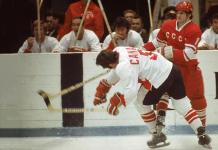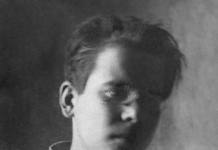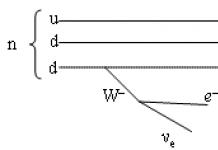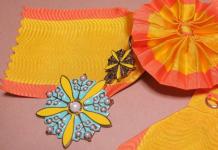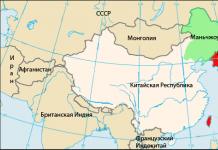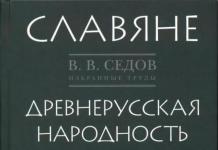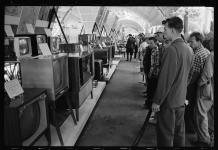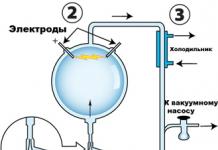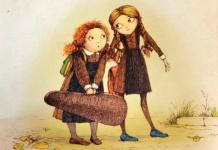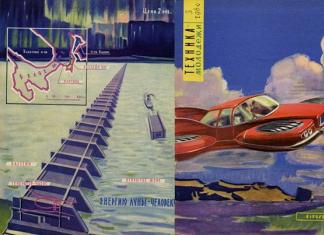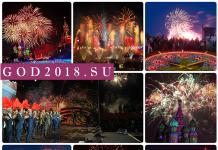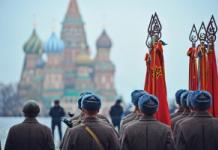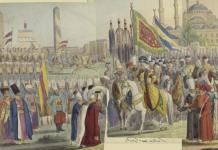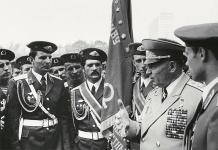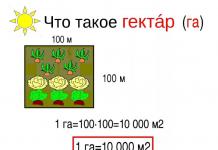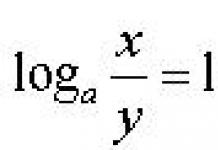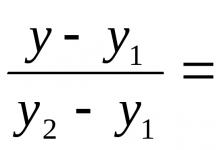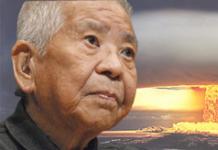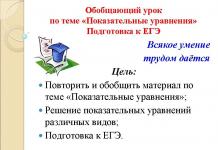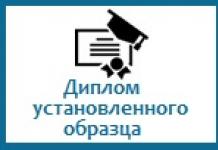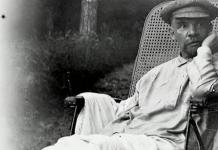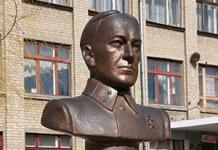Nikolay Kostomarov
(born in 1817 - d. in 1885)
A classic of Ukrainian historiography. One of the founders of the Cyril and Methodius Society.
Nikolai Ivanovich Kostomarov occupies a very special place among Russian and Ukrainian historians. This man was in love with history, he probably treated it not even as a science, but as an art. Nikolai Ivanovich did not perceive the past with detachment, from the outside. Perhaps experts will say that this is not the best trait for a scientist. But it was his enthusiasm, love, passion, imagination that made Kostomarov such an attractive figure for compatriots. It is thanks to his caring, his subjective attitude to history that she aroused the interest of Russians and Ukrainians. The merit of Nikolai Ivanovich before the Russian, and especially the Ukrainian historical science is exceptionally great. Unlike many of his contemporaries, Kostomarov insisted on the independent significance of Ukrainian history, language and culture. He infected many people with his love for the heroic and romantic past of Little Russia, its people, its traditions. Vasily Klyuchevsky wrote about his colleague as follows: "Everything that was dramatic in our history, especially in the history of our southwestern outskirts, all of this was told by Kostomarov, and told with the direct skill of a storyteller who experiences deep pleasure from his own story."
Nikolai Ivanovich Kostomarov did not absorb any special love for Little Russia from childhood, although his mother was a Ukrainian, the child was brought up in the mainstream of Russian culture. Nikolay was born on May 4 (16), 1817 in the village of Yurasovka (now Olkhovatsky district of the Voronezh region). His father, a retired captain Ivan Petrovich Kostomarov, was a landowner. At one time he liked one of the serf girls - Tatyana Petrovna. Ivan sent her to study in St. Petersburg, and upon his return he married her. The marriage was officially registered after Kolya's birth, and the father never had time to adopt the boy.
Nikolai's father was an educated man, he especially admired the French enlighteners, but at the same time he was cruel to his servants. The fate of Ivan Kostomarov was tragic. The mutinous peasants killed the master and robbed his house. This happened when Nikolai was 11 years old. So Tatyana Petrovna took care of him. Nikolai was sent to the Voronezh boarding school, then transferred to the Voronezh gymnasium. Biographers disagree as to why the future historian could not sit still. Apparently, he was expelled for pranks. But he behaved badly, in particular, because his abilities required a more serious level of teaching. In the Moscow boarding house, where Kostomarov was for some time during his father's life, the talented boy was christened enfant miraculeux(magic child).
At the age of 16, Nikolai Kostomarov went to the university closest to his native places - Kharkov. He entered the Faculty of History and Philology. At first, Kostomarov studied neither shaky nor shaky. The teachers did not make a big impression on him, he rushed from topic to topic, studied antiquity, improved languages, studied Italian. Then he became close friends with two teachers, whose influence determined his fate. One of them was Izmail Sreznevsky, described in this book, a pioneer of Ukrainian ethnography, publisher of the romantic "Zaporizhzhya Starina". Kostomarov spoke with enthusiasm about the work of this scientist, he himself was infected with love for Little Russian culture. He was also influenced by his personal acquaintance with other luminaries of the new Ukrainian culture - Kvitka, Metlinsky.
M. Lunin had a great influence on Kostomarov, who began teaching history to Nikolai and his classmates in the third year. After a while, Nikolai Ivanovich had already completely decided on his scientific predilections, he fell in love with history.
The credo of Kostomarov as a historian is being formed. He asked himself a landmark question for himself and for all Russian historiography:
“Why is it that in all stories they talk about outstanding statesmen, sometimes about laws and institutions, but they seem to neglect the life of the masses? Poor peasant, farmer, toiler, as if it does not exist for history. "
The idea of the history of the people and their spiritual life, in contrast to the history of the state, became the main idea of Kostomarov. In close connection with this idea, the scientist proposes a new approach to studying the past:
“Soon I came to the conviction that history should be studied not only from dead chronicles and notes, but also from living people. It cannot be that centuries of past life are not imprinted in the life and memories of descendants; you just need to start looking, and surely there will be much that has been missed by science until now. But where do you start? Of course, with the study of my Russian people, and since I then lived in Little Russia, then start with the Little Russian branch. "
The scientist begins his own not only archival, but primarily ethnographic research - he walks through the villages, writes down legends, studies the language and customs of the Ukrainians. (Not without incidents. On one of the "Vechornitsa", where a young student was scurrying about with a notebook, he was almost beaten by local guys.) Gradually, the romantically inclined young man is captured by pictures of the heroic past - the Cossacks, the struggle against Poles and Tatars. The historian was especially attracted by the social structure of the Sich in the Zaporozhye period of Ukrainian history. Kostomarov already stood on rather strong democratic-republican positions, so that the election of power, its responsibility before the common people could not but impress Nikolai Ivanovich. This is how his somewhat enthusiastic attitude towards the Ukrainian people as a bearer of democratic ideals is formed.
In 1836, Kostomarov passed his final exams with excellent marks, went home and there he found out that he was deprived of his Ph.D. degree for the fact that he had a “good” grade in theology in his first year - he had to retake this and some other subjects. At the end of 1837, Nikolai Ivanovich still received his candidate's certificate.
The biography of Nikolai Kostomarov is replete with unexpected twists of fate, some kind of uncertainty of the scientist's aspirations. So, for example, after graduating from university, he decided to enlist in the army, for some time he was a cadet in the Kinburn Dragoon Regiment. There, the authorities very quickly found out that the newcomer was categorically not suitable for military service - much more than fulfilling his direct duties, Nikolai Ivanovich was interested in the rich local archive in Ostrogozhsk, he wrote a study on the history of the Ostrogozh Cossack regiment, dreamed of compiling the “History of Sloboda Ukraine”. He served less than a year, his superiors in a friendly way advised him to leave the military career ...
In the spring of 1838, Kostomarov spent in Moscow, where he listened to Shevyrev's lectures. They further supported the romantic mood in him in relation to the common people. Nikolai Ivanovich began to write literary works in Ukrainian, using the pseudonyms Jeremiah Galka and Ivan Bogucharov. In 1838 he published his drama "Sava Chaly", in 1839 and 1840 - poetic collections "Ukrainian ballads" and "Vetka"; in 1841 - the drama Pereyaslavska Nich. Heroes of Kostomarov - Cossacks, Haidamaks; one of the most important topics is the fight against the Polish oppressors. Some of the works were based on Ukrainian legends and folk songs.
In 1841, Nikolai Ivanovich submitted to the faculty his master's thesis "On the causes and nature of the union in Western Russia" (it was about the Brest church union in 1596). A year later, this work was accepted for defense, but it did not bring Kostomarov a new degree. The fact is that the church and censorship spoke out categorically against such a study, and ultimately the Minister of Education Uvarov personally ordered the destruction of all copies of Kostomarov's first dissertation. The work described too many facts concerning the immorality of the clergy, heavy extortions from the population, uprisings of the Cossacks and peasants. The historian had to turn to a neutral topic. The dissertation "On the Historical Significance of Russian Folk Poetry" did not cause such a sharp reaction, and in 1844 Kostomarov successfully became a master of historical sciences. This was the first ethnographic dissertation in Ukraine.
Already in Kharkov, a circle of young Little Russians gathers around the young historian (Korsun, Korenitsky, Betsky and others), who dream of the revival of Little Russian literature, talk a lot about the fate of the Slavic world, the peculiarities of the national history of Ukraine. The life and work of Bohdan Khmelnitsky becomes the topic of the next scientific research of Kostomarov. In particular, in order to visit the places where the events associated with this powerful figure of Ukrainian history took place, Nikolai Ivanovich is assigned as a teacher to the Rivne gymnasium. Then, in 1845, he went to work in one of the Kiev grammar schools.
The following year, Kostomarov became a teacher of Russian history at Kiev University, his lectures invariably arouse great interest. He read not only history, but also Slavic mythology. As in Kharkov, a circle of progressively minded Ukrainian intellectuals gathers in a new place, cherishing the dream of developing an original Ukrainian culture, combining these national aspirations with some political ones - the liberation of the people from serfdom, national, religious oppression; a change in the system towards the republican one, the creation of a pan-Slavic federation, in which Ukraine will be assigned one of the first places. The circle was named "Cyril and Methodius Society". Kostomarov played one of the first violins in it. Nikolay Ivanovich is the main author of the programmatic work of the society - "The Book of the Life of the Ukrainian People". Other members include P. Kulish, A. Markevich, N. Gulak, V. Belozersky, T. Shevchenko. If the latter adhered to rather radical views, then Kostomarov is usually called a moderate, liberal Cyril-Methodian, he emphasized the need for a peaceful way of transforming the state and society. With age, his demands became even less radical, limited to educational ideas.
On the denunciation of student Petrov, the "Cyril and Methodius Society" was defeated in 1847. Naturally, there could be no talk of any continuation of the historian's work at the university. Kostomarov was sent to the Peter and Paul Fortress. There he served a year, after which he was sent to administrative exile in Saratov, where he lived until 1852. In Kiev, Kostomarov left his bride - Alina Kragelskaya. She was a graduate of Mrs. De Melyan's boarding school, where Nikolai Ivanovich taught for some time. Kragelskaya was a talented pianist; she was invited to the Vienna Conservatory by Franz Liszt himself. Despite the protests of her parents, who believed that Kostomarov was no match for her, Alina firmly decided to marry a historian. He rented a wooden mansion near the famous St. Andrew's Church. It was there that the police took him on March 29, 1847, on the eve of the wedding. (By the way, Taras Grigorievich Shevchenko also found himself in Kiev at that moment precisely about the upcoming wedding of his friend, Kostomarov.)
In Saratov, Kostomarov worked in the criminal department and the statistical committee. He made a close acquaintance with Pypin and Chernyshevsky. At the same time, he did not stop working on the composition of historical works, although there was a ban on their publication, which was lifted only in the second half of the 50s.
The attitude of NI Kostomarov to the tasks of the historian, to the methods of his work is curious. On the one hand, Nikolai Ivanovich emphasized that the works should be aimed at "strict, inexorable truth" and not indulge "the old prejudices of national arrogance." On the other hand, Kostomarov, like very few others, is accused of insufficient knowledge of factual material. No, of course, he worked a lot in the archives, had an amazing memory. But too often he relied only on memory, which is why he made numerous inaccuracies and simple mistakes. Moreover, with regard to comments made to him about the free handling of sources and the composing of history, it was in this that the scientist saw the vocation of the historian, for "composing" history, according to his concept, means "comprehending" the meaning of events, giving them a reasonable connection and a harmonious form not limited to rewriting documents. Here is Kostomarov's typical reasoning: “If we had not received any news that the Pereyaslavskaya Rada read the conditions under which Little Russia began to unite with the Moscow state, then I would have been convinced that they were read there. How could it be otherwise? " Such ideas are not always supported by serious historians, but Kostomarov, using "common sense", built a coherent picture of what happened, and is it not for this reason that his historical works are always colorful, interesting, captivating the reader, which, in fact, serves to popularize historical knowledge, pushes further development science (since it arouses the curiosity of the reading public).
It has already been said that Nikolai Kostomarov paid special attention to folk history as opposed to the military-administrative direction in this science. He was looking for that "end-to-end idea" that connects the past, present and future, gives events a "reasonable connection and a slender look." Kostomarov delved deeper into the historical being of a person, sometimes doing it irrationally, trying to understand the mentality of the people. The "spirit of the people" was conceived by these scientists as the real fundamental principle of the historical process, the deep meaning of the life of the people. All this led to the fact that some researchers reproach Nikolai Ivanovich with a certain mysticism.
The main idea of Kostomarov about the Ukrainian people is to emphasize its differences from the Russian people. The historian believed that democracy is inherent in the Ukrainian people, it retains and gravitates towards the specific-veche principle, which in the course of history was defeated in Russia by the beginning of "autocracy", the expression of which is the Russian people. Kostomarov himself, naturally, is more sympathetic to the specific veche structure. He sees its continuation in the Cossack republic, the period of the hetmanate in Ukraine seems to him the brightest, most majestic in the history of Ukraine. At the same time, Nikolai Kostomarov is extremely negative about Moscow's constant striving to unite and subjugate vast territories and masses of people to the will of one person, describing such figures as Ivan the Terrible, in the darkest tones, condemns the actions of Catherine the Great to liquidate the Zaporozhye freemen. In addition to Southwestern Russia, which has long preserved the tradition of federation, another ideal of Kostomarov is the veche republics of Novgorod and Pskov.
Obviously overestimating the political influence of the people in both cities, Nikolai Ivanovich deduces the history of these political formations from South-Western Russia. Allegedly, immigrants from the south of Russia introduced their democratic orders in the northern merchant republics - a theory that is in no way confirmed by modern data from the history and archeology of Novgorod and Pskov. Kostomarov expounded his views on this matter in detail in the works "Novgorod", "Pskov", "North Russian People's Governments".
In Saratov, Kostomarov continued to write his "Bogdan Khmelnitsky", began a new work on the inner life of the Moscow state of the 16th-17th centuries, made ethnographic excursions, collected songs and legends, got acquainted with schismatics and sectarians, wrote the history of the Saratov region (local history is one of the historians Wherever he was - in Kharkov, on the Volyn, on the Volga - he always carefully studied the history and customs of the local population). In 1855, the scientist was allowed a vacation to St. Petersburg, which he used to finish his work on Khmelnitsky. In 1856, the ban on the publication of his writings was lifted and police supervision was removed from him. Having made a trip abroad, Kostomarov again settled in Saratov, where he wrote "The Riot of Stenka Razin" and took part as a clerk of the provincial committee for improving the life of the peasants, in the preparation of the peasant reform. In the spring of 1859 he was invited by St. Petersburg University to the department of Russian history. The ban on teaching activity was lifted at the request of Minister E.P. Kovalevsky, and in November 1859 Kostomarov began lecturing at the university. This was the time of the most intense work in the life of Kostomarov and his greatest popularity.
Nikolai Kostomarov's lectures (the course was called "History of Southern, Western, Northern and Eastern Russia in the specific period"), as always, were perfectly received by progressive-minded youth. He characterized the history of the Moscow state in pre-Petrine times much more sharply than his colleagues, which objectively contributed to greater truthfulness in his assessments. Kostomarov, in full accordance with his scientific credo, presented history in the form of the life of ordinary people, the history of moods, aspirations, the culture of individual peoples of the vast Russian state, paying special attention to Little Russia. Soon after starting work at the university, Nikolai Ivanovich was elected a member of the archaeographic commission, edited the multivolume edition of Acts Relating to the History of Southern and Western Russia. He used the found documents when writing new monographs, with the help of which he wanted to give a new complete history of Ukraine from the time of Khmelnytsky. Fragments of Kostomarov's lectures and his historical articles constantly appeared in Russkoye Slovo and Sovremennik. Since 1865, together with M. Stasyulevich, he published the literary-historical journal Vestnik Evropy.
Kostomarov became one of the organizers and authors of the Ukrainian magazine Osnova, founded in St. Petersburg. In the journal, the works of the historian occupied one of the central places. In them, Nikolai Ivanovich defended the independent significance of the Little Russian tribe, polemicized with Polish and Russian authors who denied it. He even spoke personally with Minister Valuev after the latter issued his famous circular banning the publication of books in Ukrainian. It was not possible to convince the high-ranking dignitary of the need to soften the rules. However, Kostomarov had already lost a significant share of his former radicalism, economic issues - so interesting to other democrats - worried him extremely weakly. In general, to the displeasure of the revolutionaries, he argued that the Ukrainian people were “classless” and “bourgeois”. Kostomarov reacted negatively to any harsh protests.
In 1861, due to student riots, St. Petersburg University was temporarily closed. Several professors, including Kostomarov, organized the reading of public lectures at the City Duma (Free University). After one of these lectures, Professor Pavlov was expelled from the capital, and in protest, many colleagues decided not to go to the department. But Nikolai Ivanovich was not among these “Protestants”. He did not join the action and on March 8, 1862 tried to give another lecture. The audience booed him, and the lecture never began. Kostomarov left the faculty of St. Petersburg University. Over the next seven years, he was invited twice by Kiev and once by Kharkov universities, but Nikolai Ivanovich refused - according to some sources, on the direct instructions of the Ministry of Public Education. He had to completely go into archival and writing activities.
In the 60s from the pen of the historian came out such works as "Thoughts on the federal principle in Ancient Rus", "Traits of South Russian folk history", "Battle of Kulikovo", "Ukraine". In 1866, “The Time of Troubles of the Moscow State” appeared in the “Vestnik Evropy”; later, “The Last Years of the Polish-Lithuanian Commonwealth” was published there. In the early 70s, Kostomarov began work “On the Historical Significance of Russian Song Folk Art”. Caused by a weakening of vision, a break in archival studies in 1872 was used by Kostomarov to compile "Russian history in the biographies of its main figures." This is one of the most important works of the historian. Three volumes contain vivid biographies of princes, tsars, advisers, metropolitans, of course, hetmans, but also popular leaders - Minin, Razin, Matvey Bashkin.
In 1875, Kostomarov suffered a serious illness, which, in fact, did not leave him until the end of his life. And in the same year he married the same Alina Kragelskaya, whom he parted with like Edmond Dantes many years ago. By this time, Alina already bore the surname Kisel, had three children from her late husband, Mark Kisel.
The historian continued to write fiction, including on historical themes - the novel "Kudeyar", the stories "Son", "Chernigovka", "Kholui". In 1880, Kostomarov wrote an amazing essay "Animal Riot", which, not only in name, but also in subject matter, preceded Orwell's famous dystopia. The essay condemned the revolutionary programs of the People's Will in allegorical form.
Kostomarov's views on history in general and the history of Little Russia in particular changed somewhat at the end of his life. Increasingly, he dryly recounted the facts he found. Probably, he became somewhat disillusioned with the heroes of Ukraine's past. (And at one time he even called the so-called Ruin a heroic period.) Although, perhaps, the historian is simply tired of struggling with the official point of view. But in the work "Ukrainofilstvo", published in "Russkaya Starina" in 1881, Kostomarov continued to defend the Ukrainian language and literature with the same conviction. At the same time, the historian in every possible way disowned the ideas of political separatism.
This text is an introductory fragment. From the book of 100 great Ukrainians the author Team of authorsNikolai Kostomarov (1817-1885) historian, romantic poet, social thinker, public figure Along with the greatest scientists of the middle of the 19th century N. Karamzin, S. Soloviev, V. Klyuchevsky, M. Grushevsky is Nikolai Ivanovich Kostomarov, an unsurpassed historian and
From the book Encyclopedic Dictionary (N-O) author Brockhaus F.A.Novikov Nikolai Ivanovich Novikov (Nikolai Ivanovich) - a famous public figure of the last century, born. Apr 26. 1744 in the village of Avdotino (Bronnitsky district, Moscow province) in the family of a sufficient landowner, he studied for several years in Moscow at the university gymnasium, but in 1760
TSB From the book Great Soviet Encyclopedia (KR) of the author TSB TSB From the book Great Soviet Encyclopedia (HA) of the author TSB From the book Great Soviet Encyclopedia (SU) of the author TSBSus Nikolai Ivanovich Sus Nikolai Ivanovich, Soviet scientist, specialist in the field of agroforestry, Honored Scientist of the RSFSR (1947), honorary member of VASKhNIL (since 1956). Graduated from the Forestry Institute in St. Petersburg
From the book Great Soviet Encyclopedia (LU) of the author TSB From the book Great Soviet Encyclopedia (ZI) of the author TSB From the book Great Soviet Encyclopedia (HI) of the author TSB From the book of 100 famous Kharkiv citizens the author Karnatsevich Vladislav LeonidovichNikolay Ivanovich Kostomarov (born in 1817 - died in 1885) A classic of Ukrainian historiography. One of the founders of the Cyril and Methodius Society. Among Russian and Ukrainian historians, Nikolai Ivanovich Kostomarov occupies a very special place. This man was
From the book Great Soviet Encyclopedia (FU) of the author TSBFuss Nikolay Ivanovich Fuss Nikolay Ivanovich (29.1.1755, Basel, - 23.12.1825, Petersburg), Russian mathematician. In 1773, at the invitation of L. Euler, he moved to Russia. From 1776 an adjunct, from 1783 an ordinary academician of the Petersburg Academy of Sciences; since 1800 indispensable secretary of the academy. Most of it
From the book Big Dictionary of Quotes and Expressions the author Dushenko Konstantin VasilievichGNEDICH, Nikolai Ivanovich (1784-1833), poet, translator 435 ... Pushkin, Proteus By your flexible tongue and magic? "To Pushkin, after reading his fairy tale about Tsar Saltan ..." (1832)? Gnedich N.I. Poems. - L., 1956, p. 148 Then in V. Belinsky: "Pushkin's genius-proteus"
Nikolai Ivanovich Kostomarov - Russian historian, ethnographer, publicist, literary critic, poet, playwright, public figure, corresponding member of the Imperial St. Petersburg Academy of Sciences, author of the multivolume publication "Russian history in the biographies of its leaders", researcher of the socio-political and economic history of Russia and the modern territory of Ukraine, called by Kostomarov "southern Russia" or "southern edge". Pan-Slavist.
Biography of N.I. Kostomarova
Family and ancestors
|
N.I. Kostomarov |
Nikolai Ivanovich Kostomarov was born on May 4 (16), 1817 in the Yurasovka estate (Ostrogozhsky district, Voronezh province), died on April 7 (19), 1885 in St. Petersburg.
The Kostomarov family is noble, Great Russian. The boyar's son Samson Martynovich Kostomarov, who served in the oprichnina of John IV, fled to Volyn, where he received an estate, which passed to his son, and then to his grandson Peter Kostomarov. Peter in the second half of the 17th century participated in Cossack uprisings, fled to the Moscow state and settled in the so-called Ostrogozhchina. One of the descendants of this Kostomarov in the 18th century married the daughter of the official Yuri Blum and received the Yurasovka settlement (Ostrogozhsky district of the Voronezh province) as a dowry, which was inherited by the historian's father, Ivan Petrovich Kostomarov, a wealthy landowner.
Ivan Kostomarov was born in 1769, served in the military service and, having retired, settled in Yurasovka. Having received a poor education, he tried to develop himself by reading, reading "with a dictionary" exclusively French books of the eighteenth century. I read to the point that I became a convinced "Voltairean", that is, a supporter of education and social equality. Later N.I. Kostomarov in his "Autobiography" wrote about the addictions of a parent:
Everything that we know today about childhood, family and early years of N.I. Kostomarov is drawn exclusively from his "Autobiographies", written by the historian in different versions already in his declining years. These wonderful, in many ways works of art, in places resemble an adventure novel of the 19th century: very original types of heroes, an almost detective plot with murder, the subsequent, absolutely fantastic remorse of criminals, etc. Due to the lack of reliable sources, it is practically impossible to separate the truth from childhood impressions, as well as from the author's later fantasies. Therefore, we will follow what N.I. Kostomarov himself considered necessary to inform his descendants about himself.
According to the historian's autobiographical notes, his father was a tough, wayward, extremely hot-tempered man. Under the influence of French books, he did not put the dignity of nobility into anything and, in principle, did not want to be related to noble families. So, being already in his old years, Kostomarov Sr. decided to marry and chose a girl from his serfs - Tatyana Petrovna Mylnikova (in some publications - Melnikova), whom he sent to study in Moscow, to a private boarding school. It was in 1812, and the Napoleonic invasion prevented Tatyana Petrovna from getting an education. For a long time, among the Yurasov peasants, there lived a romantic legend about how "old Kostomar" drove the best three horses to save his former maid Tanyusha from burning Moscow. Tatyana Petrovna was clearly not indifferent to him. However, soon the courtyards turned Kostomarov against his serf. The landowner was in no hurry to marry her, and his son Nikolai, being born even before the official marriage between his parents, automatically became his father's serf.
Until the age of ten, the boy was brought up at home, according to the principles developed by Rousseau in his "Emile", in the bosom of nature, and from childhood he fell in love with nature. His father wanted to make him a freethinker, but his mother's influence kept him religious. He read a lot and, thanks to his outstanding abilities, easily assimilated what he read, and an ardent fantasy made him experience what he got to know from books.
In 1827, Kostomarov was sent to Moscow, to the boarding school of Mr. Ge, a lecturer in French at the University, but soon, due to illness, he was taken home. In the summer of 1828, young Kostomarov was supposed to return to the boarding house, but on July 14, 1828, his father was killed and robbed by the courtiers. For some reason, the father did not manage to adopt Nicholas in 11 years of his life, therefore, born out of wedlock, as a serf father, the boy was now inherited by his closest relatives - the Rovnevs. When the Rovnevs offered Tatyana Petrovna a widow's share for 14 thousand dessiatines of fertile land - 50 thousand rubles in banknotes, as well as freedom to her son, she agreed without delay.
The murderers of I.P. Kostomarov presented the whole case as if an accident had occurred: the horses were carried, the landowner allegedly fell out of the cage and died. The loss of a large amount of money from his casket became known later, so no police inquiry was made. The true circumstances of the elder Kostomarov's death were revealed only in 1833, when one of the murderers, the lordly coachman, suddenly repented and pointed out to the police his accomplices, lackeys. N.I. Kostomarov wrote in his "Autobiography" that when the guilty began to be interrogated in court, the coachman said: “The master himself is to blame for tempting us; used to start telling everyone that there is no God, that there will be nothing in the next world, that only fools are afraid of the afterlife punishment - we have taken it into our heads that if nothing will happen in the next world, then everything can be done ... "
Later, the servants, stuffed with "Voltairean sermons", brought the robbers to the house of N.I. Kostomarov's mother, who was also robbed clean.
Left with little funds, T.P. Kostomarova sent her son to a rather poor boarding school in Voronezh, where he learned little in two and a half years. In 1831, his mother transferred Nikolai to the Voronezh gymnasium, but even here, according to Kostomarov's recollections, the teachers were bad and unscrupulous, they gave him little knowledge.
After graduating from a course in a gymnasium in 1833, Kostomarov entered first at Moscow, and then at Kharkov University at the Faculty of History and Philology. Professors at that time in Kharkov were unimportant. For example, Russian history was read by Gulak-Artyomovsky, although he was a well-known author of Little Russian poems, but distinguished, according to Kostomarov, in his lectures with empty rhetoric and bombast. However, Kostomarov studied diligently even with such teachers, but, as often happens with young people, he succumbed by nature to one or another hobby. So, settling with the professor of the Latin language P.I. Sokalsky, he began to study classical languages and was especially carried away by the Iliad. V. Hugo's works turned him to the French language; then he began to study the Italian language, music, began to write poetry, and led an extremely chaotic life. He constantly spent his holidays in his village, fond of horse riding, boating, hunting, although his natural myopia and compassion for animals interfered with the last lesson. In 1835, young and talented professors appeared in Kharkov: A.O. Valitsky on Greek literature and M.M. Lunin, who lectured very fascinatingly, on general history. Under the influence of Lunin, Kostomarov began to study history, spent days and nights reading all kinds of historical books. He settled at Artyomovsky-Gulak and now led a very withdrawn lifestyle. Among his few friends was then A. L. Meshlinsky, a well-known collector of Little Russian songs.
The beginning of the way
In 1836, Kostomarov graduated from the course at the university as a full-time student, lived with Artyomovsky for some time, teaching history to his children, then passed the candidate exam and then entered the Kinburn Dragoon Regiment as a cadet.
Kostomarov did not like the service in the regiment; with his comrades, due to the different mentality of their life, he did not become close. Carried away by the analysis of the affairs of the rich archive located in Ostrogozhsk, where the regiment was stationed, Kostomarov often skimped on service and, on the advice of the regimental commander, left it. After working in the archive all summer of 1837, he compiled a historical description of the Ostrogozhsk suburb regiment, attached many copies of interesting documents to it, and prepared it for publication. Kostomarov hoped to compose the history of the entire Sloboda Ukraine in the same way, but did not have time. His work disappeared during the arrest of Kostomarov, and it is not known where he is and even whether he survived at all. In the autumn of the same year, Kostomarov returned to Kharkov, again began to listen to Lunin's lectures and study history. Already at this time, he began to think about the question: why is there so little said in history about the masses? Wanting to understand folk psychology for himself, Kostomarov began to study the monuments of folk literature in the publications of Maksimovich and Sakharov, he was especially carried away by Little Russian folk poetry.
Interestingly, until the age of 16, Kostomarov had no idea about Ukraine and, in fact, about the Ukrainian language. He only learned about the existence of the Ukrainian (Little Russian) language at Kharkov University. When in the years 1820-30 in Little Russia they began to be interested in the history and life of the Cossacks, this interest was most clearly manifested among representatives of the educated society of Kharkov, and especially in the university environment. Here, at the same time, the influence on the young Kostomarov of Artyomovsky and Meshlinsky, and partly of the Russian-language stories of Gogol, in which the Ukrainian flavor is lovingly presented. "Love for the Little Russian word carried me more and more," wrote Kostomarov, "I was annoyed that such a beautiful language remained without any literary processing and, moreover, was subjected to completely undeserved contempt."
An important role in the "Ukrainization" of Kostomarov belongs to II Sreznevsky, then a young lecturer at Kharkov University. Sreznevsky, although a Ryazan by birth, also spent his youth in Kharkov. He was a connoisseur and lover of Ukrainian history and literature, especially after he had visited the places of the former Zaporozhye and had heard a lot of its legends. This gave him the opportunity to compose "Zaporozhye Antiquity".
The rapprochement with Sreznevsky had a strong effect on the novice historian Kostomarov, strengthening his desire to study the peoples of Ukraine, both in the monuments of the past and in present life. For this purpose, he constantly made ethnographic excursions in the vicinity of Kharkov, and then and further. At the same time, Kostomarov began to write in the Little Russian language - first Ukrainian ballads, then the drama "Sava Chaly". The drama was published in 1838, and the ballads a year later (both under the pseudonym "Jeremiah Galka"). The drama drew a flattering review from Belinsky. In 1838, Kostomarov was in Moscow and listened to Shevyrev's lectures there, thinking to take the exam for the master of Russian literature, but fell ill and returned to Kharkov, having managed to study German, Polish and Czech languages and publish his Ukrainian-language works during this time.
Dissertation by N.I. Kostomarov
In 1840 N.I. Kostomarov passed the exam for the master of Russian history, and the next year he presented his thesis "On the meaning of union in the history of Western Russia." In anticipation of a dispute, he went to the Crimea for the summer, which he examined in detail. Upon his return to Kharkov, Kostomarov became close to Kvitka and also to a circle of Little Russian poets, among whom was Korsun, who published the collection "Snin". In the collection, Kostomarov, under the former pseudonym, published poetry and a new tragedy "No Pereyaslavskaya".
Meanwhile, the Kharkiv Archbishop Innokenty drew the attention of the higher authorities to the dissertation already published by Kostomarov in 1842. On the instructions of the Ministry of Public Education, Ustryalov made its assessment and recognized it as unreliable: Kostomarov's conclusions regarding the emergence of the union and its significance did not correspond to the generally accepted ones, which were considered mandatory for Russian historiography of this issue. The case got such a turn that the dissertation was burned and copies of it now constitute a great bibliographic rarity. However, in a revised form, this dissertation was later published twice, although under different names.
The story with the dissertation could have ended Kostomarov's career as a historian forever. But there were generally good reviews about Kostomarov, including from Archbishop Innokenty himself, who considered him a deeply religious person and knowledgeable in spiritual matters. Kostomarov was allowed to write a second dissertation. The historian chose the topic "On the Historical Significance of Russian Folk Poetry" and wrote this essay in 1842-1843, being an assistant inspector of students at Kharkov University. He often visited the theater, especially the Little Russian, placed in the collection "Molodik" Betsky little Russian poems and his first articles on the history of Little Russia: "The first wars of Little Russian Cossacks with the Poles", etc.
Leaving his post at the university in 1843, Kostomarov became a history teacher at the Zimnitsky men's boarding school. Then he already began to work on the story of Bohdan Khmelnytsky. On January 13, 1844, Kostomarov, not without incident, defended his dissertation at Kharkov University (it was also later published in a heavily revised form). He became a master of Russian history and first lived in Kharkov, working on the history of Khmelnitsky, and then, not receiving a department here, asked to serve in the Kiev educational district in order to be closer to the place of his hero's activity.
N.I.Kostomarov as a teacher
In the fall of 1844, Kostomarov was appointed a history teacher at a gymnasium in the city of Rivne, Volyn province. On the way, he visited Kiev, where he met with the reformer of the Ukrainian language and publicist P. Kulish, with the assistant trustee of the educational district M. V. Yuzefovich and other progressive-minded people. In Rovno, Kostomarov taught only until the summer of 1845, but he acquired the common love of both students and comrades for his humanity and excellent presentation of the subject. As always, he used every free time to make excursions to numerous historical areas of Volyn, to make historical and ethnographic observations and to collect monuments of folk art; such were delivered to him by his disciples; all these materials collected by him were printed much later - in 1859.
Acquaintance with the historical places gave the historian the opportunity to later vividly depict many episodes from the history of the first Pretender and Bohdan Khmelnytsky. In the summer of 1845, Kostomarov visited the Holy Mountains, in the fall he was transferred to Kiev as a history teacher at the 1st gymnasium, and then he taught in different boarding schools, including in women - de Mellian (Robespierre's brother) and Zalesskaya (the widow of the famous poet), and later at the Institute of Noble Maidens. His pupils and pupils recalled with delight about his teaching.
Here is what the famous painter Ge reports about him as a teacher:
|
"N. I. Kostomarov was the favorite teacher of all; there was not a single student who did not listen to his stories from Russian history; he made almost the whole city fall in love with Russian history. When he ran into the classroom, everything froze, as in a church, and the living, rich in pictures, the old life of Kiev poured, everyone turned into a hearing; but - a call, and everyone was sorry, both the teacher and the students, that the time had passed so quickly. The most passionate listener was our fellow Pole ... Nikolai Ivanovich never asked much, never gave points; it used to be our teacher tossed us a piece of paper and said quickly: “Here, we need to give points. So you do it yourself, ”he says; and what - no one was given more than 3 points. I’m ashamed, but there were up to 60 people here. Kostomarov's lessons were spiritual holidays; everyone was waiting for his lesson. The impression was that the teacher who took his place in our last grade did not read history for a whole year, but read Russian authors, saying that after Kostomarov he would not read history to us. He made the same impression in the women's boarding school, and then at the University. " |
Kostomarov and Cyril and Methodius Society
In Kiev, Kostomarov became close with several young Little Russians, who formed a circle part of the Pan-Slavic, part of the national trend. Imbued with the ideas of Pan-Slavism, which was then emerging under the influence of the works of Shafarik and other famous Western Slavists, Kostomarov and his comrades dreamed of uniting all Slavs in the form of a federation, with independent autonomy of the Slavic lands, into which the peoples inhabiting the empire were to be distributed. Moreover, the projected federation was supposed to establish a liberal state structure, as it was understood in the 1840s, with the obligatory abolition of serfdom. A very peaceful circle of intellectual intellectuals, intending to act only by correct means, and, moreover, deeply religious in the person of Kostomarov, had the appropriate name - the Brotherhood of Sts. Cyril and Methodius. He seemed to indicate by this that the activities of the Holy Brothers, religious and educational, dear to all Slavic tribes, can be considered the only possible banner for Slavic unification. The very existence of such a circle at that time was already an illegal phenomenon. In addition, its members, wishing to "play" either conspirators or Masons, deliberately gave their meetings and peaceful conversations the character of a secret society with special attributes: a special icon and iron rings with the inscription: "Cyril and Methodius". The brotherhood also had a seal on which it was engraved: "Understand the truth, and the truth will set you free." Af. V. Markovich, later a famous South Russian ethnographer, writer N. I. Gulak, poet A. A. Navrotsky, teachers V. M. Belozersky and D. P. Pilchikov, several students, and later T. G. Shevchenko, on whose work the ideas of the Pan-Slavic brotherhood were so reflected. Occasional "brothers" also attended meetings of the society, for example, the landowner N. I. Savin, who was familiar to Kostomarov from Kharkov. The notorious publicist P.A.Kulish also knew about the brotherhood. With his peculiar humor, he signed some of his messages to members of the brotherhood "Hetman Panka Kulish". Subsequently, in the III-rd department, this joke was estimated at three years of exile, although the "hetman" Kulish himself was not officially a member of the brotherhood. Just so it’s clear ...
June 4, 1846 N.I. Kostomarov was elected an adjunct in Russian history at Kiev University; classes in the gymnasium and other boarding schools, he now left. His mother also settled in Kiev with him and sold the part of Yurasovka that she had inherited.
Kostomarov was a professor at Kiev University for less than a year, but the students, with whom he behaved simply, loved him very much and were fond of his lectures. Kostomarov read several courses, including Slavic mythology, which he printed in Church Slavonic script, which was partly the reason for its prohibition. Only in the 1870s were copies printed 30 years ago put on sale. Kostomarov also worked on Khmelnitsky, using materials available in Kiev and the famous archaeologist Gr. Svidzinsky, and was also elected a member of the Kiev Commission for the analysis of ancient acts and prepared the chronicle of S. Velichka for publication.
At the beginning of 1847, Kostomarov became engaged to Anna Leontievna Kragelskaya, his student from the boarding house of de Mellan. The wedding was scheduled for March 30th. Kostomarov was actively preparing for family life: he looked after a house for himself and the bride on Bolshaya Vladimirskaya, closer to the university, and ordered a piano for Alina from Vienna itself. After all, the historian's bride was an excellent performer - Franz Liszt himself admired her performance. But ... the wedding did not take place.
On the denunciation of student A. Petrov, who overheard Kostomarov's conversation with several members of the Cyril and Methodius Society, Kostomarov was arrested, interrogated and sent under the protection of gendarmes to the Podolsk unit. Then, two days later, he was brought to say goodbye to his mother's apartment, where Alina Kragelskaya's bride, all in tears, was waiting.
“The scene was tearing apart,” wrote Kostomarov in his Autobiography. “Then they put me on the checkpoint and took me to Petersburg ... The state of my spirit was so deadly that I had the idea to starve myself to death on the way. I refused all food and drink and had the firmness to travel in this way for 5 days ... My guide from the quarter realized what was in my mind and began to advise me to leave my intention. “You,” he said, “will not inflict death on yourself, I will have time to drive you, but you will hurt yourself: they will start interrogating you, and delirium will become with you from exhaustion, and you will say too much about yourself and others.” Kostomarov listened to the advice.
In St. Petersburg the chief of the gendarmes, Count Alexei Orlov, and his assistant, Lieutenant General Dubelt, talked to the arrested person. When the scientist asked permission to read books and newspapers, Dubelt said: "You can't, my good friend, you have read too much."
Soon, both generals found out that they were dealing not with a dangerous conspirator, but with a romantic dreamer. But the investigation dragged on all spring, as the case was hampered by their "intractability" by Taras Shevchenko (he received the most severe punishment) and Nikolai Gulak. There was no court. Kostomarov learned the Tsar's decision on May 30 from Dubelt: a year of imprisonment in a fortress and an indefinite exile "to one of the distant provinces." Kostomarov spent a year in the 7th chamber of the Alekseevsky ravelin, where his already not very good health suffered greatly. However, the mother was allowed to the prisoner, books were given and, by the way, he learned ancient Greek and Spanish there.
The historian's wedding with Alina Leontyevna was finally upset. The bride herself, being a romantic nature, was ready, like the wives of the Decembrists, to follow Kostomarov anywhere. But to her parents, marriage to a "political criminal" seemed inconceivable. At the insistence of her mother, Alina Kragelskaya married an old friend of their family, the landowner M. Kisel.
Kostomarov in exile
“For the compilation of a secret society, in which the unification of the Slavs into one state was discussed,” Kostomarov was sent to serve in Saratov, with a ban on printing his works. Here he was appointed a translator of the Provincial Government, but he had nothing to translate, and the governor (Kozhevnikov) entrusted him with managing, first, a criminal, and then a secret table, where mainly schismatic cases were carried out. This gave the historian the opportunity to thoroughly familiarize himself with the schism and, although not without difficulty, to become close to its followers. Kostomarov published the results of his studies of local ethnography in Saratov Provincial Gazette, which he temporarily edited. He also studied physics and astronomy, tried to make a balloon, even engaged in spiritualism, but did not stop studying the history of Bohdan Khmelnitsky, receiving books from Gr. Svidzinsky. In exile, Kostomarov began to collect materials for studying the inner life of pre-Petrine Russia.
In Saratov, near Kostomarov, a circle of educated people was grouped, partly from exiled Poles, partly from Russians. In addition, Archimandrite Nikanor, later the archbishop of Kherson, II Palimpsestov, later a professor at Novorossiysk University, EA Belov, Varentsov, and others were close to him in Saratov; later N. G. Chernyshevsky, A. N. Pypin and especially D. L. Mordovtsev.
In general, Kostomarov's life in Saratov was not bad at all. Soon his mother came here, the historian himself gave private lessons, made excursions, for example, to the Crimea, where he participated in the excavation of one of the Kerch mounds. Later, the exiled quite calmly left for Dubovka to get acquainted with the schism; to Tsaritsyn and Sarepta - to collect materials about the Pugachev region, etc.
In 1855, Kostomarov was appointed clerk of the Saratov Statistical Committee, and published many articles on Saratov statistics in local publications. The historian collected a lot of materials on the history of Razin and Pugachev, but did not process them himself, but transferred them to D.L. Mordovtsev, who then, with his permission, used them. Mordovtsev at this time became Kostomarov's assistant on the statistical committee.
At the end of 1855, Kostomarov was allowed to go on business to St. Petersburg, where he worked for four months in the Public Library on the Khmelnitsky era, and on the inner life of ancient Russia. At the beginning of 1856, when the ban on publishing his works was lifted, the historian published in Otechestvennye Zapiski an article about the struggle of Ukrainian Cossacks with Poland in the first half of the 17th century, constituting a preface to his Khmelnytsky. In 1857, "Bogdan Khmelnitsky" finally appeared, albeit in an incomplete version. The book made a strong impression on contemporaries, especially with its artistic presentation. Indeed, before Kostomarov, none of the Russian historians turned seriously to the history of Bohdan Khmelnitsky. Despite the unprecedented success of the study and positive reviews about it in the capital, the author still had to return to Saratov, where he continued to study the inner life of ancient Russia, especially on the history of trade in the 16th-17th centuries.
The coronation manifesto freed Kostomarov from supervision, but the order prohibiting him from serving in the academic part remained in force. In the spring of 1857, he arrived in St. Petersburg, submitted his research on the history of trade to print, and went abroad, where he visited Sweden, Germany, Austria, France, Switzerland and Italy. In the summer of 1858, Kostomarov again worked in the St. Petersburg Public Library on the history of Stenka Razin's rebellion and, at the same time, wrote, on the advice of NV Kalachov, with whom he became close then, the story "Son" (published in 1859); he also saw Shevchenko, who had returned from exile. In the fall, Kostomarov took the place of a clerk in the Saratov Provincial Committee on Peasant Affairs and thus connected his name with the liberation of the peasants.
Scientific, teaching, publishing activities of N.I. Kostomarova
At the end of 1858, N.I.Kostomarov's monograph "The Riot of Stenka Razin" was published, which finally made his name famous. The works of Kostomarov had, in a sense, the same meaning as, for example, Shchedrin's Provincial Essays. They were the first scientific works on Russian history in time, in which many issues were considered not according to the template of the official scientific direction, which was not obligatory until then; at the same time they were written and presented wonderfully artistically. In the spring of 1859, St. Petersburg University elected Kostomarov an extraordinary professor of Russian history. After waiting for the closure of the Committee on Peasant Affairs, Kostomarov, after a very cordial send-off in Saratov, came to St. Petersburg. But then it turned out that the case about his professorship did not work out, it was not approved, for the Tsar was informed that Kostomarov had written an unreliable essay about Stenka Razin. However, the Emperor himself read this monograph and spoke very favorably of it. At the request of brothers D.A. and N.A. Milyutin, Alexander II allowed N.I. Kostomarov as a professor, only not at Kiev University, as planned earlier, but at St. Petersburg.
Kostomarov's introductory lecture took place on November 22, 1859 and caused a thunderous ovation from the students and the audience. Professor of St. Petersburg University Kostomarov did not stay long (until May 1862). But even during this short time, he became known as a talented teacher and an outstanding lecturer. Several very respectable figures in the field of the science of Russian history emerged from Kostomarov's students, for example, Professor A.I. Nikitsky. The fact that Kostomarov was a great artist-lecturer, many memories of his students have survived. One of Kostomarov's listeners said this about his reading:
|
“Despite his rather motionless appearance, his quiet voice and not quite clear, lisping accent with a very noticeable pronunciation of words in the Little Russian way, he read remarkably. Whether he portrayed the Novgorod veche or the tumult of the Lipetsk battle, he had to close his eyes - and after a few seconds he seemed to be transported to the center of the depicted events, you see and hear everything that Kostomarov is talking about, who meanwhile stands motionless in the pulpit; his gaze is not looking at the listeners, but somewhere into the distance, as if it is something that is seeing clearly at this moment in the distant past; the lecturer even seems to be a person not of this world, but a native of the other world, who appeared on purpose in order to inform about the past, mysterious to others, but so well known to him. " |
In general, Kostomarov's lectures greatly influenced the public's imagination, and his fascination with them can be partly explained by the lecturer's strong emotionality, constantly breaking through, despite his outward calmness. She literally "infected" the listeners. After each lecture, the professor was given a standing ovation, he was carried in his arms, etc. At St. Petersburg University, N.I. Kostomarov taught the following courses: History of Ancient Rus (from which an article was published on the origin of Rus with the Zhmud theory of this origin); ethnography of foreigners who lived in antiquity in Russia, starting with the Lithuanians; the history of the Old Russian regions (part of it was published under the title "Northern Russian People's Rights"), and historiography, from which only the beginning was printed, devoted to the analysis of the chronicles.
In addition to university lectures, Kostomarov also read public ones, which also enjoyed tremendous success. In parallel with his professorship, Kostomarov worked with sources, for which he constantly visited both St. Petersburg and Moscow and provincial libraries and archives, examined the ancient Russian cities of Novgorod and Pskov, and more than once traveled abroad. The public dispute between N.I. Kostomarov and M.P. Pogodin over the issue of the origin of Rus also belongs to this time.
In 1860, Kostomarov became a member of the Archaeographic Commission, with the assignment to edit the acts of southern and western Russia, and was elected a full member of the Russian Geographical Society. The Commission published 12 volumes of acts under his editorship (from 1861 to 1885), and the Geographical Society published three volumes of "Proceedings of the Ethnographic Expedition to the West Russian Territory" (III, IV and V - in 1872-1878).
In St. Petersburg, near Kostomarov, a circle was formed, to which belonged: Shevchenko, however, who soon died, the Belozerskys, the bookseller Kozhanchikov, A. A. Kotlyarevsky, ethnographer S. V. Maksimov, astronomer A. N. Savich, priest Opatovich and many others. This circle in 1860 began to publish the Osnova magazine, in which Kostomarov was one of the most important collaborators. Here are published his articles: "On the federal beginning of ancient Russia", "Two Russian nationalities", "Features of the South Russian history" and others, as well as many polemical articles about attacks on him for "separatism", "Ukrainophilism", " anti-Normanism ", etc. He also took part in the publication of popular books in the Little Russian language (" Metelikov "), and for the publication of Holy Scripture he collected a special fund, which was later used for the publication of the Little Russian dictionary.
"Duma" incident
At the end of 1861, due to student unrest, St. Petersburg University was temporarily closed. Five "instigators" of the riots were expelled from the capital, 32 students were expelled from the university with the right to take final exams.
On March 5, 1862, P.V. Pavlov, a public figure, historian and professor at St. Petersburg University, was arrested and administratively exiled to Vetluga. He did not give a single lecture at the university, but at a public reading in favor of writers in need, he ended his speech on the millennium of Russia with the following words:
In protest against the repression of students and the expulsion of Pavlov, the professors of St. Petersburg University Kavelin, Stasyulevich, Pypin, Spasovich, Utin resigned.
Kostomarov did not support the protest against Pavlov's expulsion. In this case, he went the "middle way": he offered to continue classes for all students wishing to study and not hold a meeting. To replace the closed university, due to the efforts of professors, including Kostomarov, a “free university”, as they said at the time, was opened in the hall of the City Duma. Kostomarov, despite all the persistent "requests" and even intimidation from the radical student committees, began to lecture there.
The "advanced" students and some of the professors who followed him, in protest against Pavlov's expulsion, demanded the immediate closure of all lectures in the City Duma. They decided to announce this action on March 8, 1862, right after the crowded lecture by Professor Kostomarov.
A participant in the student riots of 1861-62, and in the future, the famous publisher L.F. Panteleev, in his memoirs, describes this episode as follows:
|
“It was March 8, the big Duma hall was overcrowded not only with students, but also with a huge mass of the public, as rumors about some forthcoming demonstration had already penetrated into it. Now Kostomarov finished his lecture; the usual applause rang out. Then the student E.P. Pechatkin immediately entered the department and made a statement about the closure of the lectures with the same reasoning that was established at the meeting with Spasovich, and with a reservation about the professors who would continue the lectures. Kostomarov, who did not have time to move far from the department, immediately returned and said: "I will continue to lecture," and at the same time added a few words that science should go its own way, not getting entangled in various everyday circumstances. At once there were applause and booing; but here under the very nose of Kostomarov E. Utin blurted out: “Scoundrel! second Chicherin [B. N. Chicherin then published, it seems, in Moskovskiye Vedomosti (1861, Nos. 247,250 and 260), a number of reactionary articles on the university question. But even earlier, his letter to Herzen made the name of BN extremely unpopular among young people; Kavelin defended him, seeing in him a great scientific value, although he did not share most of his views. (Approx. L. F. Panteleev)], Stanislav on the neck! " The influence enjoyed by N. Utin apparently haunted E. Utin, and he then climbed out of his skin to declare his extreme radicalism; he was even jokingly nicknamed Robespierre. E. Utin's trick could blow up even a less impressionable person than Kostomarov; unfortunately, he lost all composure and, returning to the pulpit again, said, among other things: “... I don’t understand those gladiators who want to please the public with their sufferings (whom he meant understandable as an allusion to Pavlov). I see the Repetilovs in front of me, of whom the Rasplyuevs will emerge in a few years. " There was no more applause, but it seemed that the whole hall was hissing and whistling ... " |
When this egregious case became known in wider public circles, it caused deep disapproval both among the university professors and among the students. Most of the teachers decided to continue giving lectures without fail - now out of solidarity with Kostomarov. At the same time, indignation at the historian's behavior increased among the radical student youth. The adherents of the ideas of Chernyshevsky, the future figures of "Earth and Freedom", unequivocally excluded Kostomarov from the lists of "guardians for the people", having hung the professor as a "reactionary".
Of course, Kostomarov could well have returned to the university and continued teaching, but, most likely, he was deeply offended by the "Duma" incident. Perhaps the elderly professor simply did not want to argue with anyone and once again prove his case. In May 1862 N.I. Kostomarov resigned and left the walls of St. Petersburg University forever.
From that moment on, his break with N.G. Chernyshevsky and those close to him took place. Kostomarov finally goes over to liberal-nationalist positions, not accepting the ideas of radical populism. According to the people who knew him at that time, after the events of 1862, Kostomarov seemed to have “lost interest” in modernity, completely turning to the subjects of the distant past.
In the 1860s, Kiev, Kharkov and Novorossiysk universities tried to invite a historian to be their professors, but, according to the new university charter of 1863, Kostomarov did not have formal rights to a professorship: he was only a master's degree. Only in 1864, after he published the essay "Who was the first impostor?", Kiev University gave him a doctorate honoris causa (without defending his doctoral dissertation). Later, in 1869, St. Petersburg University elected him an honorary member, but Kostomarov never returned to teaching. In order to provide financial support for the outstanding scientist, he was assigned the corresponding salary of an ordinary professor for his service in the Archaeographic Commission. In addition, he was a corresponding member of the II Department of the Imperial Academy of Sciences and a member of many Russian and foreign scientific societies.
Leaving the university, Kostomarov did not abandon his scientific activities. In the 1860s, he published "North Russian People's Rights", "History of the Time of Troubles", "Southern Russia at the end of the 16th century." (alteration of the destroyed dissertation). For research "The last years of the Commonwealth" ("Bulletin of Europe", 1869. Book 2-12) N.I. Kostomarov was awarded the Academy of Sciences Prize (1872).
last years of life
In 1873, after a trip to Zaporozhye, N.I. Kostomarov visited Kiev. Here he quite by chance found out that his former bride, Alina Leontyevna Kragelskaya, by that time already widowed and bearing the name of her late husband, Kisel, was living in the city with her three children. This news deeply moved the 56-year-old Kostomarov, who was already exhausted by his life. Having received the address, he immediately wrote a short letter to Alina Leontyevna asking for a meeting. The answer was yes.
They met 26 years later, like old friends, but the joy of a date was overshadowed by thoughts of lost years.
“Instead of a young girl, as I left her, - wrote NI Kostomarov, - I found an elderly lady and a sick woman, a mother of three half-grown children. Our meeting was as pleasant as it was sad: we both felt that the best time of our separation had passed irrevocably. "
Over the years, Kostomarov also did not look younger: he has already suffered a stroke, his eyesight has deteriorated significantly. But the former bride and groom did not want to part again after a long separation. Kostomarov accepted Alina Leontyevna's invitation to stay at her estate Dedovtsy, and when he left for St. Petersburg, he took Alina's eldest daughter, Sophia, with him in order to arrange her at the Smolny Institute.
Only difficult life circumstances helped the old friends finally get closer. At the beginning of 1875, Kostomarov fell seriously ill. It was believed to be typhoid, but some doctors suggested, in addition to typhoid, a second stroke. When the patient was delirious, his mother Tatyana Petrovna died of typhus. Doctors for a long time hid her death from Kostomarov - his mother was the only close and dear person throughout the life of Nikolai Ivanovich. Completely helpless in everyday life, the historian could not do without his mother even in trifles: to find a handkerchief in the chest of drawers or light a pipe ...
And at that moment Alina Leontyevna came to the rescue. Having learned about the plight of Kostomarov, she gave up all her affairs and came to St. Petersburg. Their wedding took place already on May 9, 1875 in the estate of Alina Leontyevna Dedovtsy of the Priluksky district. The newlywed was 58 years old, and his chosen one was 45. Kostomarov adopted all the children of A.L. Kissel from the first marriage. The wife's family became his family as well.
Alina Leontyevna not only replaced Kostomarov's mother, taking over the organization of the life of the famous historian. She became an assistant in work, a secretary, a reader and even an adviser in scientific affairs. Kostomarov wrote and published his most famous works when he was already a married man. And in this there is a share of participation of his wife.
Since then, the historian spent the summer almost constantly in the village of Dedovtsi, 4 versts from the town of Priluk (Poltava province) and at one time was even an honorary trustee of the Prilutsk men's gymnasium. In the winter he lived in St. Petersburg, surrounded by books and continued to work, despite the breakdown and almost complete loss of sight.
Among the latest works, he can be called "The Beginning of Autocracy in Ancient Rus" and "On the Historical Significance of Russian Song Folk Art" (revision of the master's thesis). The beginning of the second was published in the magazine "Beseda" for 1872, and the continuation was partly in "Russian Mysl" for 1880 and 1881 under the title "History of the Cossacks in the monuments of South Russian folk songwriting." Part of this work was included in the book "Literary Heritage" (St. Petersburg, 1890) under the title "Family Life in the Works of South Russian Folk Song Creativity"; a part was simply lost (see "Kievskaya Starina", 1891, No. 2, Documents, etc. Art. 316). The end of this large-scale work was not written by the historian.
At the same time, Kostomarov wrote "Russian History in the Biographies of its Main Figures", which was also unfinished (ends with the biography of Empress Elizabeth Petrovna) and major works on the history of Little Russia, as a continuation of previous works: "Ruin", "Mazepa and Mazepa", "Pavel Half-work ". Finally, he wrote a number of autobiographies that have more than just personal meaning.
Constantly ill since 1875, Kostomarov was especially damaged by the fact that on January 25, 1884, he was knocked down by the carriage under the arch of the General Staff. Similar cases had happened to him before, for the half-blind, and besides, the historian carried away by his thoughts, often did not notice what was happening around him. But before Kostomarov was lucky: he got off with minor injuries and quickly recovered. The incident of January 25 knocked him down completely. In early 1885, the historian fell ill and died on April 7. He was buried at the Volkovo cemetery on the so-called "literary bridge", a monument was erected on his grave.
Assessment of the personality of N.I. Kostomarov
Outwardly, N.I. Kostomarov was of average height and far from handsome. The boarding school students where he taught as a young man called him a "sea scarecrow." The historian had a surprisingly awkward figure, loved to wear excessively spacious clothes that hung on him like on a hanger, was extremely absent-minded and very short-sighted.
Spoiled from childhood by the excessive attention of his mother, Nikolai Ivanovich was distinguished by complete helplessness (mother all her life tied a tie to her son and handed him a handkerchief), but at the same time, he was unusually capricious in everyday life. This was especially evident in mature years. For example, one of Kostomarov's frequent diners recalled that the elderly historian did not hesitate to be capricious at the table even in the presence of guests: did not see how they killed whitefish or ruffs, or pike perch, and therefore proved that the fish was bought inanimate. Most of all he found fault with the butter, saying that it was bitter, although it was bought in the best store. "
Fortunately, wife Alina Leontyevna had a talent for turning the prose of life into a game. Jokingly, she often called her husband "my old thing" and "my spoiled old man." Kostomarov, in turn, jokingly called her "lady".
Kostomarov's mind was extraordinary, knowledge is very extensive and not only in those areas that served as the subject of his special studies (Russian history, ethnography), but also in such, for example, as theology. Archbishop Nikanor, a well-known theologian, used to say that he did not dare to compare his knowledge of Holy Scripture with that of Kostomarov. Kostomarov's memory was phenomenal. He was a passionate esthetician: he was fond of everything artistic, pictures of nature most of all, music, painting, theater.
Kostomarov was also very fond of animals. They say that while working, he constantly kept his beloved cat next to him on the table. The creative inspiration of the scientist seemed to depend on the fluffy companion: as soon as the cat jumped to the floor and went about his cat business, the feather in Nikolai Ivanovich's hand froze powerlessly ...
Contemporaries condemned Kostomarov for the fact that he always knew how to find some negative quality in a person who was praised in his presence; but, on the one hand, there was always truth in his words; on the other hand, if under Kostomarov they began to speak ill of someone, he almost always knew how to find good qualities in him. In his behavior, a spirit of contradiction was often expressed, but in fact he was extremely gentle and soon forgave those people who were guilty before him. Kostomarov was a loving family man, a devoted friend. His sincere feeling for his failed bride, which he managed to endure through the years and all the trials, cannot but inspire respect. In addition, Kostomarov also possessed extraordinary civic courage, did not renounce his views and convictions, never followed the lead either in power (the story of the Cyril and Methodius Society) or among the radical part of the student body (the "Duma" incident).
Remarkable is Kostomarov's religiosity, stemming not from general philosophical views, but warm, so to speak, spontaneous, close to the religiosity of the people. Kostomarov, who knew well the dogma of Orthodoxy and its morality, was also dear to every feature of church rituals. Attending divine services was for him not just a duty, which he did not shy away from even during a severe illness, but also a great aesthetic pleasure.
Historical conception of N.I. Kostomarov
Historical concepts of N.I. Kostomarov, for more than a century and a half, have been causing ongoing controversy. In the works of researchers, no unambiguous assessment of its multifaceted, sometimes contradictory historical heritage has yet been developed. In the extensive historiography of both the pre-Soviet and Soviet periods, he appears as a peasant, noble, noble-bourgeois, liberal-bourgeois, bourgeois-nationalist and revolutionary-democratic historian at the same time. In addition, there are frequent characteristics of Kostomarov as a democrat, socialist and even a communist (!), Pan-Slavist, Ukrainianophile, federalist, historian of folk life, folk spirit, historian-populist, historian-lover of truth. Contemporaries often wrote about him as a romantic historian, lyric poet, artist, philosopher and sociologist. Descendants, grounded in Marxist-Leninist theory, found that Kostomarov was a historian, weak as a dialectician, but a very serious historian and analyst.
Today's Ukrainian nationalists willingly raised Kostomarov's theories on the shield, finding in them a historical justification for modern political insinuations. Meanwhile, the general historical concept of the long-deceased historian is quite simple and it makes no sense to look for manifestations of nationalist extremism in it, and even more so - attempts to exalt the traditions of one Slavic people and belittle the importance of another - is completely meaningless.
Historian N.I. Kostomarov put the opposition of state and popular principles in the general historical process of development of Russia. Thus, the innovation of his constructions consisted only in the fact that he acted as one of the opponents of the “state school” of S.M. Solovyov and her followers. The state principle was associated by Kostomarov with the centralizing policy of the great princes and tsars, the national principle with the communal principle, the political form of expression of which was the national assembly or veche. It was the veche (and not the communal, as among the “populists”) principle that embodied in N.I. Kostomarov, the system of federal structure that most corresponded to the conditions of Russia. This system made it possible to maximize the potential of the people's initiative - the true driving force of history. The state-centralizing principle, according to Kostomarov, acted as a regressive force that weakened the active creative potential of the people.
According to Kostomarov's concept, the main driving forces that influenced the formation of Muscovite Rus were two principles - autocratic and specific veche. Their struggle ended in the 17th century with the victory of the great power principle. The specific-veche beginning, according to Kostomarov, “was clothed in a new image,” that is, the image of the Cossacks. And the uprising of Stepan Razin became the last battle of the people's democracy with the victorious autocracy.
The personification of the autocratic principle in Kostomarov is precisely the Great Russian people, i.e. a set of Slavic peoples who inhabited the northeastern lands of Russia before the Tatar invasion. The South Russian lands were less affected by foreign influence, and therefore managed to preserve the traditions of people's self-government and federal preferences. In this regard, Kostomarov's article "Two Russian Nationalities" is very characteristic, which states that the South Russian nationality has always been more democratic, while the Great Russian has other qualities, namely, a creative beginning. The Great Russian nationality created a monarchy (that is, a monarchical system), which gave it priority importance in the historical life of Russia.
The opposite of the "people's spirit" of "southern Russian nature" (in which "there was nothing violent, leveling; there was no politics, there was no cold calculation, firmness on the way to the appointed goal") and "Great Russians" (which are characterized by a slavish willingness to submit to autocratic power, the desire "to give strength and formality to the unity of their land"), in the opinion of N.I. Kostomarov, various directions of development of the Ukrainian and Russian peoples. Even the fact of the flourishing of the veche system in the "northern Russian peoples' rights" (Novgorod, Pskov, Vyatka) and the establishment of a monarchical system in the southern regions of N.I. Kostomarov explained by the influence of the "South Russians", who allegedly founded the North Russian centers with their veche freemen, while such a freeman in the south was suppressed by the northern autocracy, breaking through only in the way of life and love of freedom of the Ukrainian Cossacks.
Even during his lifetime, the "statesmen" hotly accused the historian of subjectivism, the desire to absolutize the "popular" factor in the historical process of the formation of statehood, as well as the deliberate opposition of the contemporary scientific tradition.
Opponents of "Ukrainianization", in turn, even then attributed to Kostomarov nationalism, justification of separatist tendencies, and in his enthusiasm for the history of Ukraine and the Ukrainian language they saw only a tribute to the Pan-Slavist fashion that captured the best minds of Europe.
It will not be superfluous to note that in the works of N.I. Kostomarov, there are absolutely no clear indications of what should be perceived with a plus sign and what should be displayed as a minus sign. Nowhere does he unequivocally condemn autocracy, recognizing its historical expediency. Moreover, the historian does not say that specific-vechevaya democracy is unambiguously good and acceptable for the entire population of the Russian Empire. It all depends on the specific historical conditions and characteristics of the character of each nation.
Kostomarov was called a "national romantic" close to the Slavophiles. Indeed, his views on the historical process largely coincide with the basic provisions of Slavophil theories. This is a belief in the future historical role of the Slavs, and, above all, of those Slavic peoples who inhabited the territory of the Russian Empire. In this respect, Kostomarov went even further than the Slavophiles. Like them, Kostomarov believed in the unification of all Slavs into one state, but in a federal state, with the preservation of the national and religious characteristics of individual peoples. He hoped that with long-term communication in a natural, peaceful way, the difference between the Slavs would be smoothed out. Like the Slavophiles, Kostomarov was looking for an ideal in the national past. This ideal past could have been for him only a time when the Russian people lived according to their own original principles of life and were free from the historically noticeable influence of the Varangians, Byzantines, Tatars, Poles, etc. people - this is the eternal goal of Kostomarov's work.
To this end, Kostomarov was constantly engaged in ethnography, as a science capable of acquainting a researcher with psychology and the true past of each nation. He was interested not only in Russian, but also in general Slavic ethnography, especially the ethnography of South Russia.
Throughout the 19th century, Kostomarov was honored as the forerunner of "populist" historiography, an oppositionist to the autocratic system, a fighter for the rights of small peoples of the Russian Empire. In the XX century, his views were recognized in many ways "backward". With his national - federal theories, he did not fit into either the Marxist scheme of social formations and class struggle, or into the great - power politics of the Soviet empire, which was already assembled by Stalin. Difficult relations between Russia and Ukraine in recent decades have again imposed the stamp of some "false prophecies" on his writings, giving rise to the current especially zealous "self-styledists" to create new historical myths and actively use them in dubious political games.
Today, everyone who wants to rewrite the history of Russia, Ukraine and other former territories of the Russian Empire should pay attention to the fact that N.I. Kostomarov tried to explain the historical past of his country, meaning by this past, first of all, the past of all peoples inhabiting it. The scientific work of the historian never presupposes calls for nationalism or separatism, and even more so - the desire to put the history of one people above the history of another. Those who have similar goals, as a rule, choose a different path for themselves. N.I. Kostomarov remained in the minds of his contemporaries and descendants as an artist of the word, poet, romantic, scientist, who until the end of his life worked on comprehending a new and promising for the 19th century problem of the influence of an ethnic group on history. It makes no sense to interpret the scientific heritage of the great Russian historian in another way, a century and a half after the writing of his main works.
AUTOBIOGRAPHY
Dedicated to my beloved life of Galini Leontyevnya Kostomarova from Jer. Jackdaws
Childhood and adolescence
The surname that I wear belongs to the old Great Russian families of the nobles, or the children of the boyars. As far as we know, it is mentioned in the 16th century; then there were already local names resembling this nickname - for example, Kostomarov Brod on the Upa River. Probably, even then there were already existing villages with the name Kostomarove, located in the provinces of Tula, Yaroslavl and Orel. Under Ivan Vasilievich the Terrible, the boyar's son Samson Martynovich Kostomarov, who served in the oprichnina, fled from the Moscow state to Lithuania, was affectionately received by Sigismund Augustus and endowed with an estate in the Kovel (?) District. He was neither the first nor the last of these defectors. Under Sigismund III, after the death of Samson, the estate given to him was divided between his son and his daughter, who married Lukashevich. Samson's grandson, Pyotr Kostomarov, joined Khmelnitsky and after the Berestetsky defeat was banned and lost his hereditary estate in accordance with the Polish law of the kaduk, as the modern letter of the king to Kisel 2 on the selection of estates that were then subject to confiscation shows. Kostomarov, along with many of the Volynians, who had adhered to Khmelnitsky and entered the rank of Cossacks, went to the boundaries of the Moscow state. It was not the first colony from the South Russians. Even during the reign of Mikhail Fedorovich, Little Russian villages appeared along the so-called Belogorodskaya line 3, and the city of Chuguev was founded and populated by Cossacks who fled in 1638 with Hetman Ostranin 4; under Khmelnitsky, the mentioned resettlement of the Cossacks to Moscow lands was, as far as we know, the first of its kind. At that time there were up to a thousand families of all those who crossed over; they were under the command of the leader Ivan Dzinkovsky 6, who bore the rank of colonel. These Cossacks wanted to settle near the Ukrainian borders, somewhere not far from Putivl, Rylsk or Velsk, but the Moscow government found this inconvenient and decided to settle them further to the east. To their request, they were given the following answer: “You will have a frequent quarrel with the Polish and Lithuanian people, but it’s better, as far away from enthusiasm”. They were given a place for settlement on the Tikhaya Pine River, and after that /427/ the Cossack town of Ostrogozhsk was built. From local acts it is clear that this name existed even before, because it is said about the foundation of this town that it was erected on the Ostrogozh settlement. This is how the Ostrogozhsky regiment began, the first in time from the suburban regiments 6. In the vicinity of the newly built city, farms and villages began to be divorced: the land was free and fertile. Kostomarov was among the settlers, and, probably, this surname left its nickname the name of Kostomarova on the Don, now a populous settlement. The descendants of Kostomarov, who came from Volyn, took root in the Ostrogozh region, and one of them settled on the banks of the Olkhovatka River and married the pupil and heiress of the Cossack official Yuri Blum, who built a church in the name of his angel in the settlement, which he founded and named Yurasovka after him. This was in the first half of the 18th century. Blum's estate passed to Kostomarova. My father belonged to this branch.
My father was born in 1769, served in the army from a young age, participated in the army of Suvorov during the capture of Izmail, and in 1790 he retired and settled on his estate in the Ostrogozhsky district in the Yurasovka settlement, where I was born *.
* Ostrogozhsky district with the entire southern part of the Voronezh province at that time belonged to the Slobodsko-Ukrainian province - now Kharkov.
My father, according to that time, received an inadequate education and subsequently, realizing this, constantly tried to fill this inadequacy with reading. He read a lot, constantly subscribed to books, even learned French so much that he could read in that language, albeit with the help of a vocabulary. His favorite works were those of Voltaire, D'Alembert, Diderot and other encyclopedists of the 18th century; in particular, he showed respect to the person of Voltaire, which reached the point of reverence. This trend developed from him the type of an old free-thinker. He fanatically surrendered himself to materialistic teachings and became distinguished by extreme disbelief, although according to his teachers his mind fluctuated between perfect atheism and deism. His hot, addicted nature often drove him to actions that would be ridiculous in our time; for example, by the way and inopportunely, he started philosophical conversations and tried to spread Voltaireism where, apparently, there was no basis for this. Whether he was on the road, he began to philosophize with the innkeepers, and on his estate he gathered a circle of his serfs and read philippics to them against bigotry and superstition. The peasants on his estate were Little Russians and did not succumb to the Voltaire school; but from the courtyard there were several people transferred from the Oryol province, from his maternal estate; and the latter, according to their position as courtiers, who had the opportunity to use frequent conversations with the master, turned out to be more understanding /428/ students. In the political and social concepts of my late parent, some kind of mixture of liberalism and democracy with great-grandfather's nobility prevailed. He loved to interpret to everyone and everyone that all people are equal, that difference in breed is a prejudice, that everyone should live like brothers: but this did not prevent him from showing the master's stick over his subordinates on occasion, or giving him a slap, especially in a moment of irascibility with which he he could not hold back: but after each such trick, he apologized to the offended servant, tried to make up for his mistake in some way, and handed out money and gifts. The lackeys liked it to such an extent that there were times when they intentionally made him angry, in order to make him hot-tempered and then rip him off. However, his hot temper did less harm to others than to himself. Once, for example, being angry that he was not being brought to dinner for a long time, in a fit of annoyance, he interrupted the magnificent Saxon porcelain table service, and then, remembering, sat down in thought, began to examine the image of some ancient philosopher, made on carnelian, and, calling me to myself, he read to me with tears in my eyes a morality about how it is necessary to restrain impulses of passions. With the peasants of his village, he treated kindly and humanely, did not hinder them either by requisitions or work; if he invited me to do something, he paid for the work more expensive than that of strangers, and was aware of the need to free the peasants from serfdom, in which he did not hide before them. In general, it must be said that if he allowed himself antics that did not agree with the preached convictions of freedom and equality, then they arose, apart from his desire, from the inability to restrain impulses of irascibility; that is why everyone who was not put in the need to often be with him loved him. There was no lordly vanity in his character; loyal to the ideas of his French mentors, he did not put the dignity of nobility into anything and could not stand those in whom he noticed at least a shadow of panache in his origin and rank. As if to prove these convictions, he did not want to be related to noble families, and already in his old years, having conceived to marry, chose a peasant girl and sent her to Moscow to be raised in a private institution, so that later she would become his wife. This was in 1812. The entry of Napoleon into Moscow and the burning of the capital did not give her the opportunity to continue the education she had begun: my father, hearing about the devastation of Moscow, sent to take his pupil, who later became his wife and my mother.
I was born on May 4, 1817. Until the age of ten, my childhood passed in my father's house without any tutors, under the supervision of one parent. After reading "Emile" by Jean-Jacques Rousseau, my father applied the rules he had read to the upbringing of his only son and tried to teach me from infancy to a life close to nature, he did not allow me to be wrapped up, he deliberately sent me to run in a raw /429/ weather, even getting your feet wet, and generally taught not to be afraid of colds and temperature changes. Constantly forcing me to read, from my tender years he began to inspire me with Voltaire's unbelief, but this tender age of mine, which demanded the constant care of my mother for me, gave her time and the opportunity to oppose this trend. As a child, I was distinguished by an unusually happy memory: it cost nothing to me, having read once or twice some Voltaire's "Tancred" or "Zaira" in Russian translation, read it to my father by heart from blackboard to blackboard. My imagination developed no less strongly. The location where the estate in which I was born and raised lay was quite beautiful. Beyond the river, flowing near the estate itself, dotted with green islets and overgrown with reeds, towered picturesque chalk mountains, dotted with black and green stripes; next to them stretched black-earth mountains covered with green fields, and beneath them stretched a vast meadow, strewn with flowers in spring and. which seemed to me an immeasurable pictorial carpet. The entire courtyard was surrounded by a fence with large aspen and birch trees, and a shady grove with centuries-old trees that belonged to the courtyard stretched along the edge. My father often took me with him, sat on the ground under one old birch, took with him some poetry and read or forced me to read; thus I remember how, in the sound of the wind, we read Ossian with him and, as it seems, in a disgusting prosaic Russian translation. Running into the same grove without my father, I, bumping into glades and groups of trees, imagined different countries, which I saw in the figures on the geographical atlas; then I gave names to some of these places. I had Brazil, Colombia, and the Laplat Republic, and running to the river bank and noticing the islets, I created with my imagination Borneo, Sumatra, Celebes, Java and so on. My father did not allow my imagination to venture into a fantastic, mysterious world, he did not allow me to tell fairy tales, nor to indulge my imagination with tales of ghosts; he was ticklishly afraid that some vulgar belief in goblin, brownies, witches, etc., would not take root in me. However, this did not prevent me from letting me read Zhukovsky's ballads, and my father considered it his duty to constantly explain to me that all this was poetic fiction, not reality. I knew all of Thunderbolt by heart; but my father explained to me that what is described there never was, and could not be. Zhukovsky was his favorite poet; however, my father was not one of those zealots of the old taste who, having respect for old models, do not want to know new ones; on the contrary, when Pushkin appeared, my father immediately became a great admirer of him and was greatly delighted with Ruslan and Lyudmila and several chapters of Eugene Onegin that appeared in the Moscow Bulletin of 1827 7. When I was ten years old, my father took me to Moscow. Until that time, I had not been anywhere except the village, and had not even seen my district town. /430/ Upon arrival in Moscow, we stopped at the London Hotel in Okhotny Ryad, and a few days later my father took me to the theater for the first time in my life. We played Freischütz. I was so frightened by the shots and then the scene in the wolf valley with the ghosts that my father did not let me listen to the plays and after the second act he took me out of the theater. For several days I was fascinated by what I saw in the theater and I wanted to go to the theater to the extreme. My father took me. They gave "Prince Invisible" - some stupid opera, now fallen, but then in vogue. Despite my ten years of age, I realized that there was a big difference between the first opera I had seen and the second, and that the first was incomparably better than the second. The third play I saw was Schiller's Cunning and Love. The role of Ferdinand was played by the famous Mochalov 8 in his time. I liked her very much, my father was moved to tears; looking at him, and I began to cry, although I could not quite understand the whole essence of the presented event.
I was sent to a boarding school, which at that time contained a lecturer in French at the university, Ge. The first time of my stay after my father's departure from Moscow passed in incessant tears; it was unbearable for me to be alone in a foreign country and in the midst of strangers; I continually drew images of my abandoned home life and my mother, whom, as it seemed to me, the separation from me should have become difficult. Little by little, the teaching began to take hold of me and the melancholy subsided. I have acquired the love of comrades; the owner of the boarding house and the teachers were amazed at my memory and abilities. Once, for example, when I climbed into the owner's office, I found Latin conversations and learned all the conversations by heart at about half a day, and then I began to speak read Latin phrases to the boarding-keeper. I studied well in all subjects, except for dancing, for which, according to the dancemaster's verdict, I didn’t show the slightest ability, so that at the same time some called me "enfant miraculeux" 9 and the dancemaster called me an idiot. After a few months I fell ill; they wrote to my father about this, and he suddenly appeared in Moscow at a time when I was not expecting him. I had already recovered, there was a dance class in the boarding house, when suddenly my father enters the hall. After talking with the boarding-keeper, my father made it his best to take me in order to bring me back the next year after the vacations. Later I learned that the man whom my father had left with me at the boarding house as my uncle had written him some kind of slander about the boarding house; besides, I heard that the very illness that I had experienced before came from a poison given to me by this uncle, who, as it turned out, was at that time planning to get out of Moscow to the countryside by all means. Thus, in 1828 I was back in the countryside, hoping after vacations to go back to the Moscow boarding house; meanwhile, a fatal blow was being prepared over my father's head, which was to take his life and change my whole future fate. /431/
It was said above that. there were several immigrants from the Oryol province on my father's estate; of these, the coachman and valet lived in the courtyard, and the third, who had also been a lackey, was expelled from the courtyard for drunkenness and was in the village. They conspired to kill my father with the intention of robbing him of the money, which, as they happened, he had in his casket. They were also joined by a man who was my uncle during my stay in the Moscow boarding house. The villainous intent had been covered for several months, finally, the killers decided to execute it on July 14th. My father was in the habit of going for a walk in the woods at a distance of two or three versts from the yard, sometimes with me, sometimes alone. On the fateful evening in the evening, he ordered a couple of horses to be put into the droshky and, having put me with him, ordered me to go to the grove that bore the name Dolgoe. Sitting on a droshky, for some reason I did not want to go with my father and preferred, staying at home, to shoot a bow, which was then my favorite pastime. I jumped out of the droshky, my father went alone. Several hours passed, a moonlit night fell. It was time for my father to return, my mother was expecting him to have supper - he was not there. Suddenly the coachman runs in and says: "The master's horses have been carried somewhere." There was a general commotion, they were sent to look, and meanwhile two footmen, participants in the conspiracy, and - as there is a suspicion - with them and the cook did their business: they took out the box, brought it to the attic and took out of it all the money, of which there were several tens of thousands, received by my father for the mortgaged estate. Finally, one of the rural peasants, sent to find the master, came back with the news that "the pan is lying dead, and his head is dyurch and beauty". At dawn on July 15, my mother went with me to the place, and we had a terrible sight: my father was lying in a hole with his head disfigured to the point that it was impossible to notice the human image. Already 47 years have passed since then, but even now my heart is bleeding when I remember this picture, supplemented by the image of my mother's despair at such a sight. Zemstvo police arrived, carried out an investigation and drew up an act, which indicated that my father was undoubtedly killed by horses. They even found on the father's face traces of thorns from horseshoes. For some reason, the investigation did not bring about the loss of money.
Much has changed since then in my life. My mother no longer lived in the old courtyard, but settled in another, located in the same settlement. I was sent to study at the Voronezh boarding school, maintained by the gymnasium teachers there, Fedorov and Popov. The boarding house was at that time in the house of Princess Kasatkina, which stood on a high mountain on the banks of the Voronezh River, directly opposite the shipyard of Peter the Great, his zeichhaus and the ruins of his house. The boarding house stayed there for a year, and then, in connection with the transfer of the house to the military department for the cantonist school, was transferred to another part of the city not far from the Maiden Monastery, to the Borodin house. Although the new premises did not have such a beautiful view as from the previous /432/ there was a huge shady garden with a fantastic pavilion; in it, the young imagination of the students of the boarding school imagined various monstrous images drawn from scary novels, which were then in great fashion and read with great pleasure secretly from the mentors who were trying to ensure that the students read only useful books. The boarding house, in which this time I had to be brought up, was one of those institutions where most of all they bother to show something extraordinary and excellent in appearance, but in fact they give little to a proper upbringing. Despite my thirteen years of age and being playful, I realized that I would not learn in this boarding school what I would need to enter the university, which I then already thought of as a basic necessity in order to be an educated person. Most of the children who studied at this boarding house belonged to the families of landowners, in which there was such a notion that a Russian nobleman not only had no need, but even humiliatingly, to study science and listen to university lectures, that for a noble title a decent career was military service. which could be passed for a short time, just to reach some rank and then burrow into his village slum to his slaves and dogs. That is why the boarding school did not teach almost anything that was needed to enter the university. The teaching itself was carried out fragmentarily; there was not even a division into classes; one student taught one thing, another another; teachers came only to ask for lessons and to ask them again from books. The height of upbringing and education was considered to babble in French and dance. In the latter art, and here, as once in Moscow, I was recognized as a pure idiot; besides my physical sluggishness and lack of grace in movements, I could not keep in my memory a single contrasdance figure, I was constantly confused myself, knocked down others and laughed at both my comrades and the owners of the boarding house, who could not understand how I could fit this into my memory many geographical and historical names and are not able to memorize such an ordinary thing as country dance figures. I stayed in this boarding house for two and a half years and, fortunately for myself, was expelled from it for my acquaintance with the wine cellar, where, together with other comrades, I sometimes made my way at night for wine and berry waters. They whipped me and took me to the village to my mother, and my mother whipped me again and was angry with me for a long time.
At my request, in 1831 my mother assigned me to the Voronezh gymnasium. I was admitted to the third grade, which was equal to the present sixth grade in terms of the structure of the time, because then there were only four grades in the grammar school, and the first grade of the grammar school entered after three grades of the district school. However, accepting me into the gymnasium, they did me a great deal of indulgence: I was very weak in mathematics, and I was completely ignorant of ancient languages. /433/ I was placed with the teacher of the Latin language Andrei Ivanovich Belinsky. He was a good old man, a Galician by birth, who had lived in Russia for more than thirty years, but who spoke with a strong Little Russian style and was distinguished by the same conscientiousness and diligence as by mediocrity. Brought up according to the old Bursak method, he was not able to explain properly the rules of the language, nor even less to inspire love for the subject taught. Knowing his honesty and good nature, one cannot remember him with an unkind word, although, on the other hand, one cannot help but wish that we no longer have such teachers. Recalling the former Bursak customs, Andrei Ivanovich seriously expressed regret that now they do not allow students to give subit *, as it happened in his homeland with clerks who took on the duty of educators of youth.
Other teachers in the gymnasium were little pedagogical models. The mathematics teacher Fedorov, my former host at the boarding house, was lazy to the point of being inexpressible, and when he came to class, he would read a novel about himself with his feet on the table, or he would walk up and down the classroom, observing only that at this time everything were silent; for breaking the silence without ceremony he beat the guilty on the cheeks. And in his own boarding school it was impossible to learn anything from him in mathematics. It is difficult to imagine the existence of such a teacher in our time, although he was a man who knew how to show off perfectly and thus arrange a career for himself. Subsequently, already in the forties, he was the director of the schools in Kursk and, accepting a visit to a significant person in the gymnasium, he realized that this significant person looked unfavorably at polychromism, and when this significant person, observing the rich library donated by the gymnasium by Demidov, asked him whether he thinks it is appropriate to keep such a library in the gymnasium, Fedorov replied: "I find it an unnecessary luxury." This answer helped him a lot in his further career.
The teacher of Russian literature, Nikolai Mikhailovich Sevastianov, was a type of bigot, quite rare here in Russia, as we know little differing in his penchant for devotism; he composed the akathists of St. Mitrofanu, he constantly visited bishops, archimandrites and, having come to class, taught his pupils more piety than the Russian language. In addition, in his knowledge of Russian literature, he was an extremely backward person: he could not listen without disgust to the name of Pushkin, who was then, so to speak, an idol of youth; the ideals of Nikolai Mikhailovich turned to Lomonosov, Kheraskov, Derzhavin, and even to the Kiev writers of the 17th century. He taught on the rhetoric of Koshansky and asked to write arguments and impressions on it, which depicted natural phenomena - sunrise
* The custom of flogging all students on Saturdays, regardless of which of them is to blame or not. /434/
suns, thunderstorms - rhetorically praised virtues, poured out indignation towards vices, etc. miracles, miraculous icons, bishops, then asked for a lesson, watching that he was answered word for word, and recognizing someone as ignorant, forced to bow down.
The natural history teacher Sukhomlinov, brother of the former Kharkov professor of chemistry, was not a stupid man, but little prepared and little inclined towards science; however, since he was smarter than the others, despite his shortcomings as a teacher in the full sense of the word, he still could convey to his pupils some useful signs of knowledge.
The teacher of general history Tsvetaev taught on the bad history of Shrekk, did not pass on any oral stories to the students, did not illuminate the facts set out in the book with any explanations and views, did not introduce the students even in their initial form to the criticism of history and, apparently, did not like his subject: always almost sleepy and lethargic, this teacher was able to dispose his pupils to laziness and complete indifference to scientific subjects.
The Greek language was taught by the priest Yakov Pokrovsky, who was also a teacher of the law. He differed only in harsh philippics against boarding education, in general showed a dislike for secular schools, praised the seminaries and made it a rule for himself to pronounce the way it is written, demanding the same from the students, which only aroused laughter. He was an extremely rude and arrogant man, and later, as we learned, widowed, he was tried and deprived of the priesthood for unchaste behavior.
The French teacher Jourdain, a former captain of the Napoleonic army and who remained in captivity in Russia, was not distinguished by anything special, was generally lazy and apathetic, did not explain anything and only asked lessons in Lomond's grammar, marking in it with a fingernail the places followed to learn and pronouncing all the same: jusqu "ici 10. Only when he remembered on some occasion the exploits of Napoleon and his great army, the usual apathy left him and he involuntarily showed the inevitable properties of his nationality, made himself alive and uttered some boastful praise to his beloved hero and French weapons. ”At the same time, I consider it appropriate to recall the incident that happened to me in Fedorov’s boarding house, where, after Popov left, he was an assistant to the landlord and had a residence in the boarding house. I did not get along with the tutor, a German by the name of Pral; Jourdain put me on my knees and condemned me to stay without dinner. Wishing to somehow soften his severity, I, on my knees during dinner, said to him: monsie ur Juordin, because Prahler is German for braggart. “Chut! tesez vous! " - hissed Jourdain 11. But I continued: these Germans are big boasters, because like their Napoleon /435/ beat! "Oh, how he beat!" - Jourdain exclaimed and, delighted, began to remember the Jena battle. Taking advantage of his animation, I asked him for forgiveness, and the stern captain relented and allowed me to sit down to dinner.
The German teacher was a certain Flamm, who did not have a special pedagogical talent and did not understand Russian well, which is why his subject did not flourish in the gymnasium. The disciples, as happened everywhere in Russia with the Germans, fooled over his inability to speak Russian. So, for example, not knowing how to pronounce the word “accent” in Russian, instead of saying “accentuate,” he said “take a punch,” and the students, making fun of him, all pounded their fists in one gulp on the notebook. The German lost his temper, but could not explain what he wanted, and the whole class laughed at him.
It remains to say a few more words about the then director of the gymnasium, von Haller. He was distinguished by the fact that each student, coming from a home vacation, considered it his duty to bring a feasible gift: some a couple of geese, and some a pound of tea or a head of sugar; the director went out to the student in the hallway, scolded him for his insolence, said that he was not a bribe-taker and drove the student away with his gift; but in the vestibule, where the pupil left the hallway, a female servant appeared, took the gift and carried it to the back porch. The student came to the class and noticed that the director, during his usual visit to classes, showed him special affection and favor. For several years the director occupied the entire mezzanine of the gymnasium building for himself, and the classrooms were located in the attics; this prompted the teachers to file a denunciation against him: the inspector arrived, and the director had to move from the gymnasium building to a rented apartment. Soon thereafter, his superiors removed him from office.
The number of students in the gymnasium at that time was small and hardly reached up to two hundred people in all classes. According to the concepts prevailing at that time, wealthy parents who were proud of their origin or important rank considered it as if humiliating to send their sons to the gymnasium: therefore, the institution was filled with children of minor officials, poor merchants, bourgeois and commoners. Plebeian origin was manifested very often in the methods and methods of conversion of the pupils, as well as in the neglect of the primary education received in the parental home. Rough curses, fights and dirty fun were nothing in this circle. Among the students there were quite lazy people who almost did not go to the gymnasium, and those who were more diligent were accustomed in advance to look at the teaching only as a means useful in life to get their daily bread. One can judge about the hunt for science from the fact that out of those who graduated from the course in 1833, I entered the university in the same year, and three of my comrades entered the number of students when I was already in my second year.
During his stay at the gymnasium during the vacations /436/ I drove home to my mother; sometimes they sent their horses and a carriage for me, in the summer - a chaise, and in the winter - a covered sleigh; sometimes I followed the postage. In both cases, the route lay to Ostrogozhsk along the postal road through the villages of Oleniy Kolodez, Khvorostan and the city of Korotoyak, where they crossed the Don. Before reaching Korotoyak, the road for about forty versts went in the view of the Don on the left side; near Khvorostan, one could see the picturesque village of Onoshkino, which in 1827 slid down the mountain washed away by the Don. This natural phenomenon, as they say, cost no one life, because almost all people were in the field. From Ostrogozhsk, if I rode on my own horses, I had to make my way to my settlement through the farmsteads, of which there are many in this direction. Until the very settlement, I did not meet a single church. The farmsteads through which I drove were all free, inhabited by the so-called military inhabitants, the descendants of the former Ostrogozh Cossacks and their assistants. This whole region was called Rybianskoye, and the inhabitants of the farms, like the cities, were, as it were, called rybians, unlike other Malorussians. They had a different dialect and costume from the others. Subsequently, having visited Volyn, I saw that both of them denounces purely Volyn immigrants in fish, while residents of other parts of the Ostrogozh district further south denounce their origin from other parts of the Malorussian region with their reprimands, clothes and home furnishings. The fish then lived generally prosperous; they had plenty of land, while others sent various trades and crafts.
Beli had to go by post office, then the path lay somewhat eastward, to Pushkin khutor, where the horses changed; there was a philistine post office, and by hiring postage, one could go to Yurasovka. Usually, leaving Voronezh, I reached Yurasovka the next day, but if I went by post office, then earlier. My mother's new house was about five chambers, covered with reeds and stood at the end of the settlement in a huge courtyard, where, in addition to the house, barns, sheds and stables, there were three huts, and in the back of the courtyard there was an orchard, tithes in three, resting on a hemp plant, bordered two rows of tall willows, behind which stretched an immeasurable swamp. Before, as they say, a river flowed here, but in my time it was all overgrown with reeds and sedge, with the exception of a few stretches, and that in summer they were densely covered with patches *.
* The water plant Nymphea is a pitcher.
There were a significant number of apple, pear and cherry trees in the garden, bearing fruit of delicious varieties. In one corner of the garden there was a scammer for bees, which my mother loved very much. The garden along the fence was planted with birches and willows, and I also planted maple and ash trees there. Horseback riding was a favorite pastime during the days of my mother's stay. I had a gray horse, bought by my father in the Caucasus, extremely fast and meek, although not without whims: as soon as I got off it, it was now struggling, kicking with its hind legs and running at full speed into it. /437/ nyushin. I rode it on both my own and other people's fields. Apart from this amusement, I sometimes went to shoot, but due to my myopia I was not distinguished by any special art; besides, I was sorry to exterminate innocent creatures. I remember one time I shot a cuckoo and killed it; I felt so sorry for her that for several days my conscience seemed to torment me. In summer vacations, my hunting exploits most successfully turned to blackbirds, which sat in thick clouds on cherries and devoured berries. There was no need to aim here: it was only worth throwing a charge of shot at the tops of the cherries and picking up the killed and shot birds in heaps, then giving them to the kitchen for cooking on the roast.
In addition to hunting and horse riding, I was fascinated by swimming on the water. In the absence of a real boat, I arranged for myself a ship of my own invention: these were two boards connected to each other, on which nights were placed 12. I sat down on those nights with an oar and went for a walk on the reeds. Since the plyos near my house were not large and, moreover, the dense roots of latati blocked the path of my improvised ship, I transported it seven miles away to someone else's estate, where the river was wider and cleaner, went there to swim and often spent whole days there, often forgetting and lunch.
In 1833, when I was already awaiting the end of my grammar school course, an unexpected and extremely unpleasant event happened in my house. My mother left for me in Voronezh for the winter Christmastide. At this time, robbers attacked our village house at night: they tied the watchman, crippled several courtyard people, hammering awls under their nails, burned with a candle, asking if the lady had money; then they went into the house, knocked the locks in the dressers and wardrobes and robbed everything. When the investigation began, it turned out that the culprit of this robbery was the landowner of the Valuisky district, a retired warrant officer Zavarykin, and one of our Maloruss peasants was in contemplation with him, the other was from strangers in the same settlement. The perpetrators were exiled to Siberia.
In the same year, the real cause of my father's death was revealed. The coachman, who was taking him to the forest, came to the priest and demanded that the people be gathered together with the ringing: he will announce the whole truth about his death at the master's grave. This was done. The coachman publicly, falling to the grave, which was near the church, cried out: “Master, Ivan Petrovich, forgive me! And you, Orthodox Christians, know that it was not horses who killed him, but we, the villains, and took the money from him, and bribed the court with them. " The investigation began, then the trial. Kucher denounced two lackeys, who, however, stubbornly locked themselves out of murder, but could not hide the fact that they were robbing money and bribing the court with them. The cook was also involved, but he locked himself in everything and, for lack of evidence, was left alone. The most important of the killers was already in the grave. It is remarkable that when the guilty began to be interrogated in court, the coachman said: “The master himself is to blame for tempting us; used to start telling everyone that there is no God, that there will be nothing in the next world, that only fools are afraid of the afterlife punishment - /438/
"In history, as in life, once a mistake is made, a number of others are followed, and what is spoiled in a few months and years is corrected for centuries."
N. Kostomarov
The Rare Books Department has opened an exhibition "Outstanding Historian and Social Thinker" dedicated to the 200th anniversary of the birth of the Russian historian, ethnographer, publicist, poet and public figure, corresponding member of the Imperial St. Petersburg Academy of Sciences, Nikolay Ivanovich Kostomarov(1817-1885), the author of the multivolume edition " Russian history in its main figures”, A researcher of the socio-political and economic history of Russia, one of the leaders of the Cyril and Methodius Society.
Portrait of Nikolai Ivanovich Kostomarova, artist Makovsky K.E.
The merits of Kostomarov for the development of national historical science cannot be overestimated. Nikolay Ivanovich the author of more than 160 historical works, a scientist with his own vision of the Russian historical process.
The role of N.I. Kostomarova is enormous in the development of Russian and Ukrainian historiography. He was the first scientist in Eastern Europe who radically changed the approach to the work of a historian, placing at the forefront not the description of events and personalities, but the history of the people in its socio-cultural integrity and the unity of the most diverse spheres of life. Kostomarov is the first historian in Russia who understands history as folk psychology.

He spoke about the free development of the Slavic peoples: Russians, Ukrainians, Belarusians and the federal structure of the Slavic states, condemned serfdom, advocated the weakening of centralized power. The scientist's judgments did not meet the requirements of those in power in the 19th century, he did not get into the pantheon of "correct" historians in Socialist Russia, despite the fact that Kostomarov's works were studied and outlined by Karl Marx, Lenin, the historian was enrolled in the category of ideologists of bourgeois nationalism, almost not mentioned, not published.
And yet, later the work of N.I. Kostomarov received fame and recognition not only in Russia and Ukraine, but also in Western Europe, the USA, Canada. In 1967, by decision of UNESCO, the 150th anniversary of the birth of Kostomarov was celebrated all over the world.
Academician Petr Petrovich Tolochko at the celebration of the 175th anniversary of the birth of Kostomarov said:
“What Nikolai Ivanovich Kostomarov did in science is not enough for one human life. The largest Russian historian. Many people are not comfortable with it because of the unconventional nature of their views. It seemed to the Ukrainians that Kostomarov was not a “Ukrainian” enough in scientific research. The Russians did not want to understand which South Russian branch he was talking about. And now it is confirmed that the scientist foresaw the course of history ... Kostomarov's populism had a great influence on the entire Ukrainian historical school of the second half of the 19th - early 20th centuries, although the scientist himself brought a lot of troubles. He differed from the representatives of the official historical science of Russia by his democratism, a high sense of duty to the truth of history, unconventional views ... It must be admitted that he and his work rightfully belong to two peoples; Ukrainian and Russian. The only trouble is that until that time we could not properly evaluate his selfless work, make his greatest creative heritage the property of our peoples, and adequately perpetuate the memory of him. "
Nikolay Ivanovich Kostomarov was born in the village Yurasovka, now Olkhovsky district of the Voronezh region on May 4, 1817. His father, Ivan Petrovich Kostomarov, there was a local landowner, and mother, Tatiana Petrovna Mylnikova (Melnikova), his serf peasant from the Ukraine. Nikolai Ivanovich was born out of wedlock - his father married his mother later, he never managed to adopt a son.

House-Museum NicholasKostomarova
When Nikolai was eleven years old, his father was killed by serfs for cruel treatment of them, and Nikolai remained a forced serf serf. It cost Tatyana Petrovna a lot of work to redeem her son from slavery from her husband's cousin. In 1833, Nikolai graduated from the Voronezh gymnasium and entered Kharkiv University.
V 1842 year Kostomarov submits a dissertation to Kharkiv University " On the significance of the union in Western Russia". On the basis of factual material, Kostomarov vividly portrayed the lust for power of the patriarchs, the immorality of the Orthodox clergy, the plight of the peasants, the benefits that the need to fight against the union brought to the education in Ukraine. By order of the Minister of Public Education S.S. Uvarova Kostomarov's defense was canceled, and all copies of the dissertation were burned.
V 1843 year Kostomarov submitted a new dissertation - " On the historical significance of Russian folk poetry"And defended her early next year. V 1846 year Kostomarov gets a place as a teacher of Russian history at Kharkov University, and a year before that he became one of the organizers of the political secret " Society of St. Cyril and Methodius", Which included such figures of Ukrainian culture as T.G. Shevchenko, V.M. Belozersky, Af. Markevich.
The dream of the members of the community was Federation all Slavic peoples, with the absence of serfdom in any form, with the absence of customs, free trade, with the autonomy of the internal policy of each part of the federation.
V 1847 year on denunciation, all members of the society were arrested. Kostomarov was arrested on the eve of his wedding with Alina Leontyevna Kragelskaya(1830-1908). On the night of March 30 1847 of the year N.I. Kostomarov was taken into custody and sent to St. Petersburg. He spent a year in Peter and Paul Fortress and then was exiled to Saratov, with the prohibition to publish their works and engage in teaching.

Kostomarov and Kragelskaya
In Saratov, he met G. Chernyshevsky, continued to engage in scientific research, went on ethnographic expeditions, begun in Ukraine, got acquainted with schismatics.
V 1856 year, police surveillance and a ban on publishing were removed from Kostomarov. V 1859 year he became a professor at St. Petersburg University, headed the department of Russian history. A huge number of students and volunteers came to his lectures, the youth idolized him. Kostomarov was a talented speaker, at the end of the lecture the students gave a long standing ovation and carried their favorite teacher out of the audience in their arms. The original concepts set forth by Nikolai Ivanovich aroused keen interest among his contemporaries, scientists, intellectuals, and students were drawn to him.
Fifties and first half of the seventies XIX v. - the flourishing of Kostomarov's scientific activities. He works a lot in archives, publishes scientific works, the most famous of which are “ Russian history in the biographies of its main figures" and " Essay on the domestic life and customs of the great Russian people in the 16th and 17th centuries". As a member of the Archaeographic Commission, he published 12 volumes of acts on the history of Ukraine and wrote a number of separate monographs, which were to be later compiled “ History of Ukraine».
Twenty-eight years later, in 1875 year Kostomarov still married Alina Leontyevna Kisel (née Kragelskaya), over the years that they did not see each other, she got married, gave birth to three children, became a widow. They lived together for 10 years, in 1887 year Nikolai Ivanovich died. In the last years of his life he was seriously ill, practically blind. Kostomarov rested on Literatorskie mostki in St. Petersburg. Alina Leontyevna, having buried Kostomarov, disposed of his scientific and literary heritage.
"The true love of a historian for his Fatherland can only be manifested in strict respect for the truth.", - repeated Nikolay Ivanovich... He followed this principle all his life.

At our exhibition we presented lifetime editions of books and journal articles by N.I. Kostomarova showing the variety of his works, both scientific, historical and literary. All exhibited publications are from a personal library G.V. Yudina. Studying the history of the existence of books from the library of a Siberian bibliophile, we found out that in his collection of Kostomarov's works there are books that previously belonged to famous people.
So, a copy of the book “ Archive of historical and practical information relating to Russia ", 1860 (book. 1), formerly belonged to the largest historian of pre-revolutionary Russia Sergei Mikhailovich Soloviev(1820-1879). A copy of the book " Sketch of the trade of the Moscow state in the XVI-XVII centuries ", 1862, formerly belonged to a lawyer and teacher Alexander Avgustovich Gerke(1878-1954), graduated from Imperial School jurisprudence in 1899 and in 1904 - the Faculty of History and Philology of St. Petersburg University, was left to prepare for the professorship. Secretary of the Petersburg Court of Justice, official of the Ministry of Justice, titular counselor. After the October Revolution of 1917, he taught history in grammar schools and schools.
Elena Albertovna Laktionova
"N. I. Kostomarov ".
1850s.
KOSTOMAROV Nikolay Ivanovich (05/04/1817-07.04.1885) - Ukrainian and Russian historian, ethnographer, writer, critic.
N.I. Kostomarov was the illegitimate son of a Russian landowner and a Little Russian peasant woman. In 1837 he graduated from Kharkov University. In 1841 he prepared his master's thesis "On the causes and nature of union in Western Russia", which was banned and destroyed for deviating from the official interpretation of the problem. In 1844 Kostomarov defended his dissertation "On the Historical Significance of Russian Folk Poetry". From 1846 he served as professor at the Department of History at Kiev University.
Together with TG Shevchenko, he organized the secret Cyril and Methodius Society, was the author of its charter and program. This secret nationalist political organization for the first time raised the question of the independence of Little Russia from Russia, considering Little Russia an independent political entity - Ukraine. The members of the society set out to create a Slavic democratic state headed by Ukraine. It was supposed to include Russia, Poland, Serbia, Czech Republic, Bulgaria. In 1847 the society was closed, and Kostomarov was arrested and, after a year's imprisonment, was exiled to Saratov.
Until 1857, the historian served in the Saratov Statistical Committee. In Saratov he met N. G. Chernyshevsky. In 1859-1862. was a professor of Russian history at St. Petersburg University.
Arrest, exile, works on the history of popular movements ("Bogdan Khmelnitsky and the return of South Russia to Russia", "The Time of Troubles of the Muscovite State", "Stenka Razin's Riot") made Kostomarov famous. For popular reading Kostomarov wrote "Russian history in the biographies of its main figures." He was one of the organizers and collaborator of the Osnova magazine (1861-1862), which was published in Russian and Ukrainian. Has appeared in the magazines Sovremennik and Otechestvennye zapiski.
As a theorist of Ukrainian nationalism and separatism, Kostomarov put forward the theory of "two principles" - veche and autocratic - in the history of the people of Little Russia, which he considered independent, not Russian. He believed that the exclusive feature of Ukraine is its "classlessness" and "bourgeoisness". Kostomarov refers to ethnographic material as the main one, in his opinion, for understanding the history of the people. In his opinion, the main task of the historian is the study of everyday life, "folk psychology", "the spirit of the people", and ethnography is the best means for this.
Kostomarov was a romantic poet. He published collections of poems "Ukrainian Ballads" (1839), "Vetka" (1840). In the dramas "Savva Chaly" 91838), "Pereyaslavskaya Night" (1841), in a nationalist spirit, he portrayed the national liberation struggle of the people of Little Russia in the 17th century.
School encyclopedia. Moscow, "OLMA-PRESS Education". 2003 year.
"Portrait of the historian Kostomarov".
1878.

Nikolai Ivanovich Kostomarov was born in 1817 into a landowner family in the village of Yurasovka, Ostrogozhsky district, Voronezh province. From 1833 he studied at the Kharkov University at the Faculty of History and Philology, in 1844 he received the title of Master. Already in 1839 he published two collections of Ukrainian songs - "Ukrainian Ballads" and "Vetka". This is how he began his development as a writer and ethnographer, an excellent connoisseur of Ukrainian poetry.
After graduating from the university, he taught at the Rivne, and then at the Kiev first gymnasium, and in June 1846 he was elected an adjunct of Russian history at the Kiev University of St. Vladimir. As Kostomarov later recalled, the procedure for electing him by the university council consisted in the fact that he had to give a lecture at the council on a given topic. In this case, it boiled down to the question "from what time should Russian history begin." The lecture “made the best impression. After my removal from the council chamber, Kostomarov wrote, a ballot was held, and an hour later the rector of the university, professor of astronomy Fedotov, sent me a note in which he informed me that I had been adopted unanimously and there was not a single vote contrary to my election. It was one of the brightest and most memorable days of my life. The university department has long been a desired goal for me, but I didn’t hope to achieve it so soon ”.
This is how his scientific and pedagogical activity began in the field of the history of Russia and Ukraine. And although Kostomarov wrote in the memoirs cited above that from that moment he "began to live in perfect solitude, immersed in history," he did not become an armchair scientist, a kind of Pimen, indifferent to "good and evil." He did not remain deaf to the call of the realities of contemporary life, absorbing and sharing the liberation ideas of the progressive people of Russia and Ukraine, which were widespread in the early 40s of the last century. Acquaintance with the first edition of Shevchenko's Kobzar (1840), with his poem Gaidamaki (1841) and the immortal Zapovit (1845) had a stimulating effect on Kostomarov and his friends, who organized the “Slavic Society of St. Cyril and Methodius "(as it is called in the charter, but known under the name" Cyril and Methodius Society "). In 1990, a three-volume collection of documents was published, reflecting the history of this organization and making it possible for the first time to thoroughly study this striking historical phenomenon and the role of Kostomarov in it. Among the so-called material evidence in the "Kostomarov case" we find his manuscript (autograph) in Ukrainian called "The Book of the Buttya of the Ukrainian People" ("The Book of the Life of the Ukrainian People"), where the author's most important ideological positions are formulated in the form of a biblical legend.
In verse 10, the author writes: "And Solomon, the wisest of all people, was allowed by the Lord into great madness, and therefore he did it to show that even if he is smart, he will become stupid as soon as he becomes autocratic." Then, painting already evangelical times, the author states that the kings and pans, having accepted the teachings of Christ, perverted it ("overwhelmed"). This villainous act Kostomarov concretizes the example of the history of Russia, showing how freely the Russians lived without a tsar, and when he reigned, “bowing and kissing the feet of the Tatar Basurman Khan, together with the Basurmans, enslaved the Muscovites” (verse 72). And when “Tsar Ivan in Novgorod strangled and drowned tens of thousands of people in one day, the chroniclers, telling this, called him Christ-loving” (verse 73). In Ukraine, “they did not create either a tsar or a lord, but created a brotherhood-the Cossacks, to which everyone could join, be he a pan or a slave, but always a Christian. There, everyone was equal, and the foremen were elected and were obliged to serve everyone and work for everyone. And there was no pomp, no title among the Cossacks ”(verses 75-76). However, the Polish "lords and Jesuits wanted to forcibly turn Ukraine under their rule ... then brotherhoods appeared in Ukraine, such as the first Christians had," but Ukraine nevertheless fell into captivity to Poland, and only the uprising of the people liberated Ukraine from the Polish yoke, and she stuck to Muscovy as to a Slavic country. “However, Ukraine soon saw that it had fallen into captivity, it, in its simplicity, did not yet know what a tsar was, and the tsar of Moscow is like an idol and a tormentor” (verses 82-89). Then Ukraine "fought back from Muscovy and did not know, poor thing, where to turn her head" (verse 90). As a result, she was divided between Poland and Russia, and this "is the most useless thing that has ever happened in the world" (verse 93). Then the author reports that Tsar Peter “laid hundreds of thousands of Kozaks in ditches and built a capital for himself on their bones”, and “Queen Catherine the German, all-world curva, sheer atheist, finished the Cossacks, as she took away those who were foremen in the Ukraine, and endowed them with free brothers, and some became masters, and others - slaves ”(verses 95-96). “And so Ukraine disappeared, but it only seems,” the author concludes (verse 97) and outlines a way out: “Ukraine“ will soon wake up and shout to the whole wide Slavic region, and they will hear her cry, and Ukraine will rise and become an independent Rzeczpospolita (ie. e. republic. - BL) in the Slavic union "(verses 108-109).
If we add to this a poem, also in Ukrainian, which was seized during a search at Kostomarov's apartment and mistakenly attributed by the gendarmes to T.G. Shevchenko, but actually written by Kostomarov, then we can determine the worldview and historical-philosophical positions of the 30-year-old historian. Much, of course, is unacceptable for us (for example, the thesis that Catherine II created the feudal system in Ukraine), but the analysis of the poems allows us to define the ideology of Cyril and Methodius society as national liberation and democratic; Kostomarov obviously took an active part in its formation. It should be noted that Kostomarov was not, to use the modern popular term, neither a Russophobe, nor a Polonophobe, nor a Ukrainian nationalist. He was a man who deeply believed in the need for fraternal unity of all Slavic peoples on a democratic basis.
Naturally, during interrogations, Kostomarov denied the existence of society and his belonging to it, explained that the golden ring with the inscriptions “Kyrie eleison” (“Lord have mercy” - BL) and “St. Cyril and Methodius "is not at all a sign of belonging to society, but an ordinary ring that Christians wear on their fingers in memory of the saints, referring to the widespread ring with an inscription in memory of St. Barbara. But all these explanations were not accepted by the investigators, and, as can be seen from the definition of the III Department of His Imperial Majesty's Chancellery dated May 30-31, 1847, approved by the tsar, he was found guilty (especially since “he was the oldest in years, and by the rank of professor, he was obliged to turn young people away from the wrong direction ") and was sentenced to imprisonment" in the Alekseevsky ravelin for one year "followed by sending" to serve in Vyatka, but not in the scientific part, with the establishment of the strictest supervision over him; the works "Ukrainian ballads" and "Vetka" published by him under the pseudonym of Jeremiah Galka should be banned and withdrawn from sale. "
Nicholas I allowed Kostomarov to meet with his mother only in the presence of the commandant of the fortress, and when the mother began to literally bombard the III department with petitions for the early release of her son and sending him to Crimea for treatment due to his illness, not a single petition was granted, they always appeared short, like a shot, resolution "no", drawn by the hand of the head of the department L. V. Dubelt.
When Kostomarov served a year in the fortress, then instead of the replacement of the link in Vyatka requested by his mother, he was exiled to Simferopol by order of Nicholas I to the city of Saratov with the issuance of 300 rubles. silver lump sum. True, not at all out of a feeling of compassion, but only because, as the almighty chief of the gendarmes and the head of the III department, Adjutant General Orlov, reported that the broken-hearted Kostomarov “made it his first duty to express in writing the most lively loyal gratitude to Your Imperial Majesty for the fact that Your Majesty, instead of severe punishment, according to their feelings of goodness, they gave him the opportunity to atone for his previous delusion by diligent service. " This dispatch to Saratov did not yet mean complete release, since Kostomarov was accompanied by a gendarme, Lieutenant Alpen, who had to make sure that his supervised did not enter "unnecessary conversations with strangers." The lieutenant, so to speak, "handed over" Kostomarov to the Saratov civil governor M. L. Kozhevnikov. True, Orlov ascribed on the official attitude towards Kozhevnikov: “I ask you to be merciful to him, a man with dignity, but he was mistaken and sincerely repentant”, which, however, did not prevent him from turning to the Minister of Internal Affairs L.A. Perovsky with a proposal to establish Kostomarov "the strictest supervision". He sent a similar order to the chief of the 7th district of the gendarmes corps N.A. Akhverdov, so that he would establish secret surveillance of Kostomarov in his subordinate Saratov and report every six months on his behavior.
The Saratov exile is an important stage in the ideological development of Kostomarov, here he became close to N. G. Chernyshevsky and the historian D. L. Mordovtsev, who had just begun in those years to develop the history of popular movements and imposture. While working in the provincial government, Kostomarov had the opportunity to familiarize himself with secret affairs, among which there were cases on the history of the schism. In Saratov, he wrote a number of works, which when published after exile and in the conditions of social upsurge in the 50-60s of the XIX century. became widely known, putting their author in the first row among the then historians. A special place in these studies is occupied by works on Ukrainian history.
During these years, Kostomarov achieved, in modern terms, rehabilitation. On May 31, 1855, he appeals to Alexander II, who recently ascended the throne, with a petition in which he writes: “At the present time, when Your Imperial Majesty has deigned to commemorate your accession to the throne with a deed of immeasurable mercy that sheds a ray of consolation to the most serious criminals, I dare to pray your sovereign goodness, sir, about mercy to me. If supervision over me were limited to the sole observation of my political convictions, then I would not dare to wish to free myself from it, for I have no other convictions except those that are prescribed to me by the law and love for my monarch. But police supervision, combined with the need to be exclusively in one place, constrains me in my work and home life and deprives me of the means to improve the vision disease that I have been suffering from for several years. Sovereign Father! Honor with the eye of compassion one of the deluded, but truly repentant children of your great Russian family, deign to grant me the right to serve you, sir, and to live unsecured in all places of the Russian Empire of Your Imperial Majesty. "
The Collegium of Petitions forwarded Kostomarov's petition to Section III. On June 27, 1855, A. F. Orlov, in his written report, supports Kostomarov's request, simultaneously informing that “of the persons involved in the same society, the collegiate registrar Gulak, who was the main reason for the compilation of the society, as well as officials Belozersky and Kulish, no less guilty than Kostomarov have already received the most merciful forgiveness. " On this document, Alexander II superimposed the "I agree" resolution in pencil. But this relatively quick satisfaction of Kostomarov's request still did not mean the provision of complete freedom of activity, since A.F. Orlov, informing the Minister of Internal Affairs D.G. Bibikov about the Tsar's decision, warned that Kostomarov was not allowed to serve "in the academic field." ... So, released from supervision Kostomarov in December 1855 left for St. Petersburg. At the same time, he offered the editor of Otechestvennye zapiski his work "The Age of Tsar Alexei Mikhailovich", but the censor of the magazine demanded a certificate that the ban on Kostomarov's works, imposed back in 1847, was lifted. In January 1856, Kostomarov applied for permission to publish of this article in Section III and received permission to publish it with the resolution of L. V. Dubelt: "Only strictly censor."
Of the major works, Kostomarov published in 1856 in Otechestvennye zapiski his work "The struggle of the Ukrainian Kozaks with Poland in the first half of the 17th century to Bohdan Khmelnitsky", and in 1857 - "Bogdan Khmelnitsky and the return of South Russia to Russia." These studies acquainted a wide circle of the Russian reading public with the bright pages of the history of the fraternal people, asserted the indissolubility of the historical destinies of the two Slavic peoples. They were also an application for the further development of the Ukrainian theme.
But in the field of Russian history, Kostomarov continued to deal with previously unexplored problems. So, in 1857-1858. Sovremennik publishes his work Sketch of the Moscow State's Trade in the 16th and 17th Centuries, and in 1858 his famous Riot of Stenka Razin appears on the pages of Otechestvennye Zapiski - a highly relevant work in the conditions of the imminent first revolutionary situation in Russia.
But there was still one more obstacle to his scientific and pedagogical activity. On September 27, 1857, Kostomarov wrote to the new head of the III department, V. A. Dolgorukov: “Not realizing in myself either hunting or aptitude for civil service and, moreover, having been engaged in national history and antiquities for a long time, I would like to enter the academic service in department of the Ministry of Public Education ... If the mercy of the emperor, who freed me from supervision, does not cancel the previous imperial command in the bose of the deceased emperor to prevent me from academic service, please, your Excellency, to cast at the feet of the all-merciful emperor the emperor my all-submissive request to grant me join the academic service under the Ministry of Public Education. " Prince Vasily Andreevich already on October 8 ordered to talk about this with the Minister of Public Education, the latter considered it "inconvenient to allow Kostomarov to serve in the academic field, unless only as a librarian."
Meanwhile, the council of Kazan University in 1858 elected Kostomarov professor; as you would expect. The Ministry of Public Education did not approve this election. However, in 1859, the trustee of the St. Petersburg educational district petitioned for the appointment of Kostomarov as an ordinary professor of Russian history at St. Petersburg University, as evidenced by the attitude of the assistant minister of public education V. A. Dolgorukov. The latter said that this requires the highest permission, which, obviously, was obtained, since in the certificate of the III department of November 24, 1859 we read: “Kostomarov is known for his scholarship in the field of history, university, has earned the general approval of the audience, including many outsiders. "
So, the attempt of the St. Petersburg University council to elect Kostomarov as an extraordinary professor in the department of Russian history was crowned with success. Kostomarov "conquers" the capital thanks to a sensational discussion with the famous historian MP Pogodin about serfdom in Russia, and a year later - in connection with his reasoned opposition to the so-called Norman theory of the origin of Russia, shared by Pogodin ...
To characterize the degree of social activity and state of mind of Kostomarov from the moment he was released from supervision and exile, and until his approval as a professor at St. Petersburg University, it would be useful to report that in 1857 he managed to visit Sweden and Germany for eight months. France, Italy and Austria, along the way working in archives and libraries (we especially note the work in Sweden, which provided material for the monograph about Mazepa), and after returning in 1858 he was directly involved in the work on the preparation of the peasant reform, becoming a clerk of the Saratov Provincial Committee for Improvement the life of the landlord peasants. In 1859, when the provincial committees virtually ceased their activities, he moved to St. Petersburg, replacing the retired professor N. G. Ustryalov.
By the early 1960s, Kostomarov had firmly established himself as an excellent lecturer and one of the leading historians. He published in Sovremennik in 1860 "An Outline of the Domestic Life and Morals of the Great Russian People in the 16th and 17th Centuries", in the "Russian Word" - the work "Russian Foreigners. The Lithuanian tribe and its relationship to Russian history ", and, finally, in 1863, one of the most fundamental studies of Kostomarov," Northern Russian popular rule in the days of the specific veche structure. Novgorod - Pskov - Vyatka ".
By this time, Kostomarov, booed by disgruntled students, was forced to leave the teaching department. The students were dissatisfied with what they thought was the unseemly act of the professor, who did not join the protest against the expulsion of Professor P.V. Pavlov. This episode is described in sufficient detail by Kostomarov in his autobiography. Let's use his story. When St. Petersburg University was closed in 1861 due to student protests, and at the beginning of 1862 many arrested students were released from the fortress, the idea arose of giving public lectures for a very reasonable fee in order to make up for the losses caused by the closure of the university. In early February 1862 Kostomarov began teaching a course in Russian history in the 15th century. In his own words, he did not interfere in student affairs: “I did not take the slightest part in the then (1861 - BL) university issues, and although students often came to me to talk with me about what to do , but I answered them that I did not know their deeds, that I only knew science, to which I had completely devoted myself, and that everything that did not directly relate to my science did not interest me. The students were very unhappy with me for such a presentation of themselves to their student business ... ". This was the background against which the events of the spring of 1862 played out, when a free university was already functioning, available to everyone who wanted to listen to the lectures read in the spacious hall of the City Duma. On March 5, the professor of this university P. V. Pavlov, not in the building of the Duma, the official place of lectures, but in a private house on the Moika, where the literary evening was held, read his article "The Millennium of Russia." In the text that he showed Kostomarov the day before, he did not find anything that could “draw the unfavorable attention of the authorities.” ... The next day, Pavlov was arrested.
In response to the arrest, some of the professors, under the influence of student demands, stopped lecturing. Kostomarov, however, objected to this, arguing that "the termination of lectures does not make any sense."
When Kostomarov came to give a lecture on March 9, some of the students who demanded an end to lectures in protest against Pavlov's arrest staged him; others, according to the historian, shouted "Bravo, Kostomarov!" Kostomarov wrote on behalf of a group of professors a petition to the Minister of Public Education for Pavlov's release, but it did not yield results. Soon Pavlov was exiled to Kostroma, and Kostomarov himself, stung by the ingratitude of the students, submitted his resignation. Since then, he has not been involved in teaching, concentrating entirely on scientific work. ...
Until recently, it was possible to observe, albeit paradoxical, but touching unity in the assessment of Kostomarov's ideological positions by Soviet historiographers and foreign nationalists. So, in 1967, the University of Michigan Publishing House publishes a study with the characteristic title: "Nikolai Ivanovich Kostomarov: Russian historian, Ukrainian nationalist, Slavic federalist" (Popazian Dennis. "Nickolas Ivanovich Kostomarov: Russian historian, ukranian nationalist, slavic federalist"), and seven years earlier the second volume of Essays on the History of Historical Science was published by the Nauka Publishing House, in which, on p. 146 is printed in black and white: "Kostomarov entered historiography primarily as an exponent of the views and interests of the emerging Ukrainian bourgeois-landlord nationalism." Truly extremes converge.
B. Litvak. Villain Hetman.
"Nikolay Ivanovich Kostomarov".

I saw the historian Kostomarov for the first time, when he came to us soon after his exile. (* In 1846 in Kiev, the Cyril and Methodius Brotherhood was organized around N.I. Kostomarov was arrested in the spring of 1847 and, after a year's imprisonment in the fortress, was exiled to Saratov, where he remained until 1855.) I knew in detail about his arrest and his expulsion from St. Petersburg.
It was evident from Kostomarov's morbid appearance that all this trouble had cost him dearly; he dined with us and, apparently, was happy that he could live in Petersburg again.
Leaving his dacha on a steamer, he asked Panaev for the whole year "Bell", which he had not had the opportunity to read in exile. The package was quite bulky. A cabman was brought in, and Kostomarov left, promising to come back to the dacha soon.
Less than half an hour of time had passed when I saw Kostomarov walking through an abandoned garden near our dacha, separated from it by a rather wide groove.
Gentlemen, this is Kostomarov! How did he get to the garden? - I said to Panaev and Nekrasov.
At first they did not believe me, but after looking carefully, they were convinced that it was exactly him. We all went to the alley and called out to Kostomarov, who was walking quickly.
I'm looking for how to get to your dacha! - he answered. They explained to him that he had got to the wrong place - and that he had to go back to the highway.
We went to meet him and noticed that he was very alarmed about something.
What happened to you? - we asked him.
A great misfortune, ”he said quietly. - Let's go to the dacha as soon as possible, I'll tell you everything there, it's inconvenient to tell you here!
We, too, were alarmed, wondering what kind of misfortune happened to him.
Arriving at the dacha, Kostomarov, exhausted from walking, sank onto a bench, and we surrounded him and waited impatiently for an explanation. Kostomarov looked around in all directions and said quietly:
Nobody will eavesdrop on us? .. I have lost the "Bell".
Lord, we thought that God knows what happened to you! - said Nekrasov with annoyance.
Where did you drop it? - asked Panaev.
I don't know myself; I wanted to put on an overcoat in my sleeves, put the bundle next to me. Thought ... grab it, but he's gone! I rather gave the money to the cabby and walked back along the highway in the hope that I would find him, but I could not find him. So someone picked up the package.
It is clear that he raised it, if you did not find it, - answered Panaev, - and if an educated person found it, then he will mentally thank the one who gave him the opportunity to read The Bell for a whole year.
What if they take it to the police? The search will go - and the cabman will indicate where he got the rider from?
What's the matter with you, Kostomarov? - Panaev remarked to him.
And your footman can say that I have lost it!
Yes, the footman was not even in the garden when you left, ”Nekrasov reassured him.
Why am I taking the Bell with me! - Kostomarov said in despair.
They began to calm him down, they even laughed at his fright, but he said:
Ah, gentlemen, a frightened crow is afraid of a bush. If you had to experience what I experienced, then you would not laugh now. I was convinced from experience how a person can suffer a lot from a trifle. Returning to Petersburg, I vowed to be careful - and suddenly I acted like a boy!
Kostomarov was persuaded to stay overnight, because he had a fever, and besides, he would have missed the steamer if he had gone. I made him hot tea with cognac to warm him up.
At the dacha, I usually got up early and went swimming. It was not yet 7 o'clock when I entered the glass gallery to go out into the park, and Kostomarov was already sitting in it.
What's your fever? I asked him. Kostomarov replied that he had not slept all night, inquired at what time the first steamer was leaving, and suddenly asked jokingly:
Look ... what kind of person is this?
I stood with my back to the glass door and turned around.
This is our Pyotr, probably coming from the bath, ”I said, and told the footman to put the samovar on as soon as possible in order to give Kostomarov some coffee.
I didn't go swimming, but stayed with Kostomarov. I advised him not to go on the steamer, as he did not feel well, and meanwhile there could be a rolling.
I'd better order the droshky to be put in, - I said, - they will take you to Peterhof, and there you will find yourself a half-wheelchair and you will get there much more calmly.
Kostomarov was very happy about my proposal and said that, given his mood, it would be unpleasant for him to be in a crowd of passengers. He waited impatiently for the coachman to lay the droshky.
I woke up Panaev and said that Kostomarov was leaving.
Panaev, sleepy, went out to Kostomarov, who fussed when he saw that the droshky was ready.
Panaev, saying goodbye to him, said:
Come to us whenever you like, in the morning and spend the night with us.
Oh no! - answered Kostomarov. - Thank you: my trip to you made such an impression on me that I will not show my nose to your Peterhof.
He had already left the steps of the gallery, but returned again, saying:
My God, where is my head, I forgot such an important thing. We need to come to an agreement so that there is no contradiction in the testimony.
Which ones? - asked Panaev.
God, well, if they ask about the lost bundle.
Yes, fullness, Kostomarov!
Not! I'm an experienced person ...
I will say that I have lost! - said Panaev. Kostomarov was taken aback.
And the witness?
Cab! Panaev laughed.
Forget about the "Bell", figure it out for yourself, how is it possible to find out who lost the bundle on the highway! Didn't your driver know about the loss of him?
Still I would have told him that! I gave the money, saying that I had changed my mind to go to the steamer, and went back, and he drove on.
Well, so how can he point to you? Kostomarov pondered, waved his hand and said: "Well, what will be, it will not be avoided!" - and, shaking hands with us, sat down in the droshky and drove away.






